































When Lisa Folawiyo started designing clothes 20 years ago, she had one goal: to make cool, modern, and fashion-forward clothes for women. She wanted clothes that could be identified as Nigerian but with a contemporary twist. It was about taking what is ours and creating something that intersected the world because even though we come from different parts of the world, fashion is one thing that unites everyone. Although she used traditional fabrics, she always had to think of ways to elevate them to make them more desirable so that they became designs people hadn’t seen or thought about. That’s where the idea of craftsmanship, hand beading and embroidery came from.
The Lisa Folawiyo brand has evolved beyond its signature Ankara designs to work with different textiles, making custom prints and fabrics. Another significant stride is that the brand now also designs for men.
Lisa Folawiyo’s journey in the fashion industry is fascinating; read all about it on pages 8 to 10.
The world as we know it is changing; economic downturns and technology can make some careers extinct in the twinkle of an eye. However, some jobs will never go extinct, regardless of how far technology advances. We analyse those jobs on page 14.
Did you know that your underwear is the foundation of your outfit? Wearing the wrong underwear can ruin the most stunning look. This week’s fashion piece guides you through the right underwear for different outfits. Scroll to pages 4 and 5 for this.
This week, we have another electrifying playlist for you. Click on the instructions below the QR codes to download it from page 16. Until next week, enjoy your read.







SUNDAY, MARCH 16, 2025
THEWILL NEWSPAPER • www.thewillnews.com


SUNDAY, MARCH 16, 2025
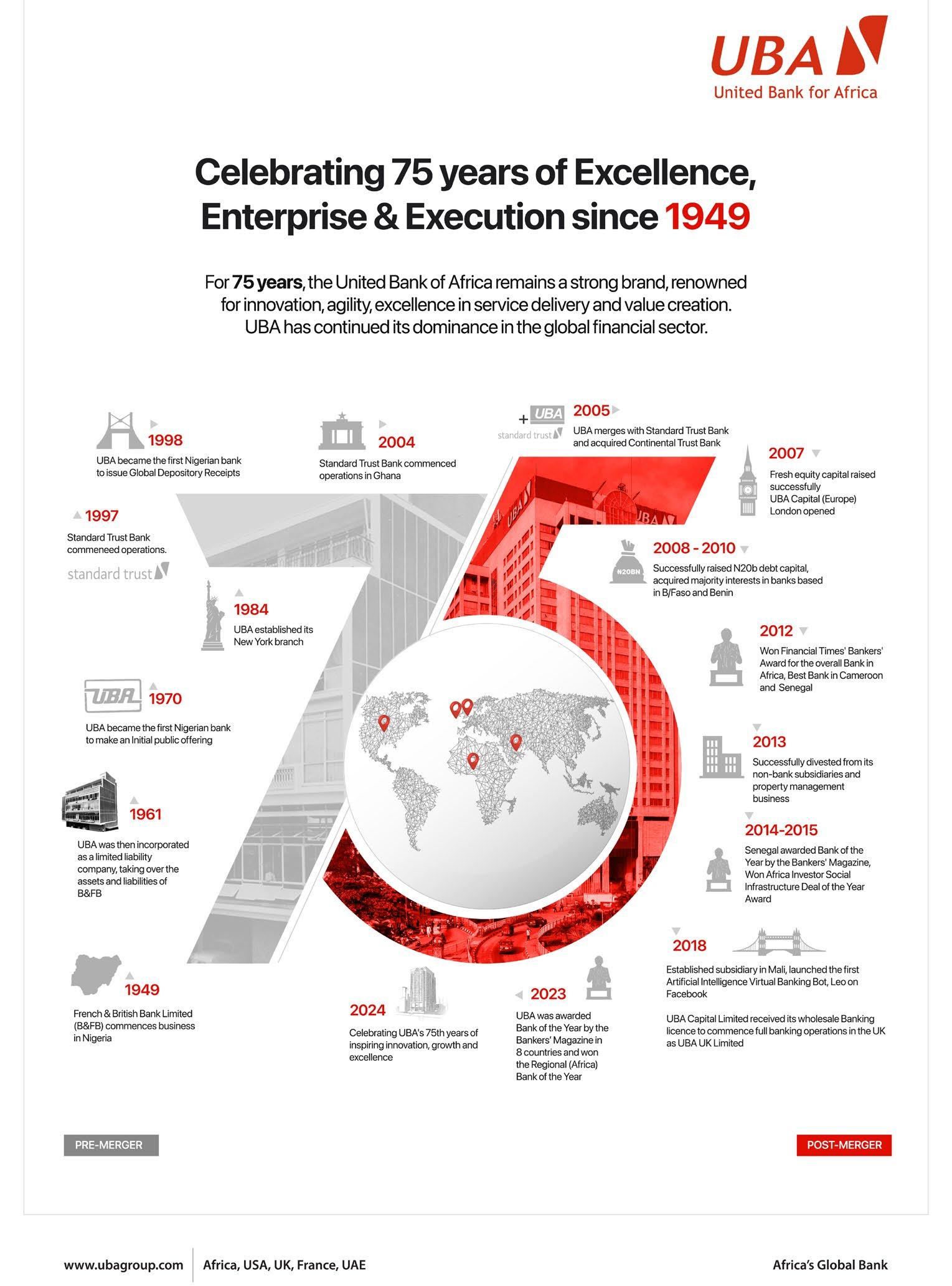

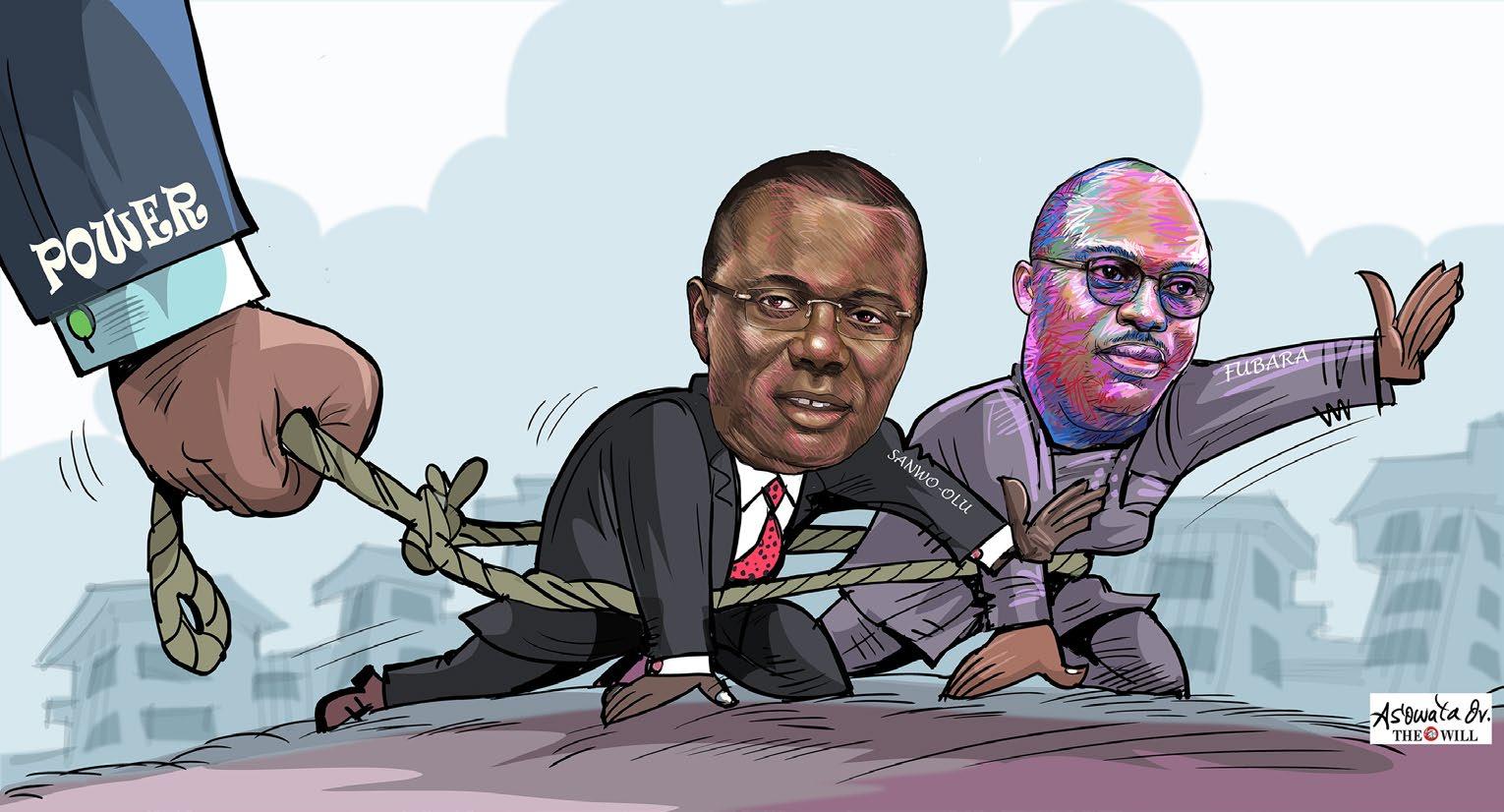
BY AMOS ESELE
Governor Siminalayi Fubara of Rivers State and his counterpart in Lagos State, Babajide Sanwo-Olu, belong to two different political parties, the major opposition Peoples Democratic Party, PDP and the governing All Progressives Congress, APC, respectively, but they are facing similar challenges in the current political dispensation. While impeachment has been staring Fubara in the face from the outset of the supremacy battle with his benefactor, Nyesom Wike, Minister of the Federal Capital Territory, FCT, and majority of the Rivers State House of Assembly members, Sanwo-Olu has been literally walking on slippery ground as a fall-out of an ongoing leadership crisis in the Lagos State Assembly.
How the dashing Governor of Lagos State survives the remaining two years of his tenure is entirely up to him, following developments over the leadership crisis in the State House of Assembly. THEWILL was first to report that President Bola Tinubu believes that Sanwo-Olu orchestrated the removal of Hon. Mudashiru Obasa as Speaker of the Lagos House of Assembly without his knowledge or consent.
The embarrassing drama that unfolded during the leadership tussle before the President directly intervened to restore order, showed that neither Sanwo-Olu, some influential members of the Governance Advisory Council (GAC) nor the majority of the elected members of the House of Assembly, who were not keen on Obasa’s return to the office of Speaker, could control what they had started. A reliable government source who chose to be anonymous, said the President’s annoyance was with the process of Obasa’s removal, “which speaks volumes about their loyalty to the president.”
As reported by this newspaper, President Tinubu was miffed at being left in the dark about the impeachment. Yes, he had heard complaints about Obasa’s disrespect for the governor, party leaders and members of the assembly and roundly condemned it, but the source said they should have allowed the internal
resolution mechanism of the party to fix the problem.
“The conspirators, as it turned out, waited till Tinubu departed for Abu Dhabi on an official assignment before carrying out their plan. That showed disloyalty and lack of trust which also goes with it. “After the President’s meeting with the lawmakers, nothing was said about the fate of the governor, but from experience he should know that henceforth any act deemed unlawful or unconstitutional which would ordinarily be overlooked may receive the maximum political punishment akin to impeachment,” the source said. This is like saying that Sanwo-Olu’s political future henceforth is for him to determine. Much earlier, President Tinubu was said to have recalled the embarrassing 2023 presidential election results in Lagos when he left the state in the governor and his team’s charge while campaigning all over the country and then had to suffer defeat in the hands of Peter Obi of the Labour Party.
Multiple sources say the reinstatement of Obasa is not designed to hurt Sanwo-Olu politically, since it is still within his power to avert it. But it is being used as an instrument to maintain cohesion within the governing structure in the state. “Even President Tinubu himself had always consulted widely within the party and other political structures before taking decisions on crucial matters because he knows that political order is very key to running systems at all levels,” one of the sources said.
THEWILL gathered that President Tinubu has not met face to face with Sanwo-Olu since Obasa’s initial removal though the governor has been sending emissaries to appease the president.
THEWILL also gathered authoritatively that the Economic and Financial Crimes Commission (EFCC) has expanded its investigation into the tenure of the embattled governor and has interviewed more state officials close to the governor, as well as non-political associates, including a female socialite who threw a lavish birthday party abroad last year.
CASES IN THE PAST
There were decisive moments, under similar circumstances,






that “the meeting went well,” agreed to field questions from reporters.
A Lagos State government official, who spoke with THEWILL on the condition of anonymity, said he was unaware of any form of punishment or threat to Governor Sanwo-Olu. He argued that the governor had never and will never do anything against the wish of President Tinubu, adding that whatever happened in the State Assembly was purely the work of the legislators.
“What we learnt and which I think is correct in that meeting between the President and the legislators ended in the peaceful resolution of the leadership crisis in the state assembly. The governor did allow them (the lawmakers) to run their show. Please respect the separation of powers here,” the source said.
Reminded that moves to reinstate Obasa and reconcile the aggrieved members of the Assembly was brokered in the Marina residence of the governor, he stated that Sanwo-Olu was duty bound to play a role he likened to that of a father mediating in the quarrels of his children.
However, a social cultural group for Lagos State indigenes, De Renaissance Patriots, which had been against the reinstatement of Obasa and supported the retention of Mojisola Meranda for purely identity reasons, disagreed with the manner the crisis in the Assembly was resolved.
Spokesperson of the group, Prince Bashir Adefaka, in a note sent to THEWILL at the weekend, said the Chairman, retired MajorGeneral Tajudeen Olanrewaju, is full of pity for Governor SanwoOlu. In the note, the retired general said: “I can tell Governor Babajide Sanwo-Olu to watch his back because he is more possibly going to be the victim of this whole scenario. Obasa has now been crowned as leader of the APC in Lagos State holding brief for the leader who is currently occupied with a national assignment in Abuja.”
Gen. Olanrewaju, who is a former Minister of Communications, further said, “There were litigations that were not concluded except mitigations unknown to the Constitution of the party. At the end of the day, a Lagos state indigene, Hon. Mojisola Lasbet Meranda, was a victim and lost her legitimate election. Full stop.”
He called on indigenes of the state to learn from these events and prepare to “choose their indigenes as governorship, deputy governorship, Speaker, Secretary to the Lagos State Government, Head of Service, Chief Judge candidates and Chairmen of Local Government Areas in the soon to be conducted LGA polls and the upcoming general elections in 2027.”
UNFOLDING
Similarly, Governor Fubara is facing the reality of a possible impeachment by the Rivers State’s House of Assembly where 27 aggrieved lawmakers who are in the majority are spoiling for war. The Martins Amaewhule-led Assembly on Friday adjourned its sittings indefinitely, a day after the governor notified the lawmakers of his plan to present the 2025 budget on Wednesday, March 19, for consideration and approval.
This decision, the governor said, was in compliance with the Supreme Court judgment and in response to the lawmakers’ request for him to re-present the budget.
Earlier, the lawmakers on Wednesday denied the governor’s access to the premises of the House of Assembly to represent the budget on the grounds that the 12-hour notice was too short and the communication for the meeting by the Secretary to the Government was conveyed through social media. Despite the governor’s formal notice on Thursday, the Amaewhule-led assembly on Friday adjourned plenary indefinitely, escalating the political crisis in the State.
For the Amaewhule led -legislature which has been handed temporary control of the Assembly through the recent Supreme Court ruling before the pending adjudication on the substantive court case on their defection, the strategy is to get the governor to do their bidding under the threat of impeachment.
Sensing that the governor appeared to be buying time until the pending suit on defection is resolved, the lawmakers tried without success to remove the prop for the governor: they summoned the Chairman of the Rivers State Independent Electoral Commission, RSIEC, retired Justice Adolphus Enebeli and his team to appear before the Assembly.
Some RSIEC Commissioners answered the summons, but the Chairman declined and instead got his lawyers to write the Assembly leadership reminding them of the need to convey their
language with civility as required in a democracy setting. Then, the lawmakers tried to get Commissioners appointed by Governor Fubara and cleared by the five-man Victor Oko-Jumbo led-Assembly to resign to no avail. Rather, the Commissioners, like the RSIEC Chairman, took the Assembly to court. Undaunted, the lawmakers tried to rattle the Chief Judge and force him to resign by sending a petition on alleged age falsification against him to the Director of State Service, DSS.
Wike, leading to the bulldozing of the Assembly complex last year.

Unfazed, RSIEC chairman, retired Justice Enebeli, had scheduled the local government election for August 9 after securing the updated voters register from the Independent National Electoral Commission, INEC. “There is no doubt that something is going on in the other camp to get at the governor,” said Jake Epelle, founder of Albino Foundation, who told THEWILL on Friday that he is on a mission to mediate between Governor Fubara and Wike for peace to reign in the state.
“I met the governor for seven minutes last week and I can tell you he is willing to embrace peace. But I have been unable to reach FCT Minister Nyesom Wike. One of his men, Chidi Lloyd had agreed with me to go together to see Wike, but somehow, he stopped answering my calls and my text messages. He has probably been told what to do. I think the governor has responded well to the issues after the Supreme Court ruling that the action taken by the five-man Assembly was illegal. They claim he responded through social media to their request to represent the budget. He went the extra mile by writing again because he wants the issue resolved. Now they have shut down the House of Assembly,” he added. Epelle said the impeachment of Fubara cannot hold, vowing that relevant stakeholders would pull all the stops to prevent it from happening because it would further aggravate the tension in the state, which is desperately in search of peace to restore normalcy that has eluded it for several months now.
Senator George Sekibo, however, faulted some moves by Governor Fubara. Speaking at the weekend on national television, he said after the apex court ruling, they were invited for a meeting alongside the lawmakers. At that meeting, it was agreed that the lawmakers should write to the governor to come and represent the budget, he said, adding, “The governor did not go.”
He further said, “Budget presentation is a serious business. You cannot go to the Assembly unannounced. President Tinubu intervened at a point and the warring parties signed an agreement, Fubara made a U-turn on the resolutions. Besides, the Commissioners and RSIEC Chairman who failed to answer the summons by the Assembly, all went to court. These are the governors’ men.”
The ensuing stalemate has heightened tension in the state, especially in the face of intemperate language being used in interviews, comments and statements on the ongoing political impasse, Mr Epelle noted.
The public perception now is that the Amaewhule-led legislature is bent on impeaching the governor, a mission that first reared its head at the height of the supremacy battle between Fubara and

Everybody involved in this matter should come to the negotiation table. Fubara and Wike should be locked in a room where they can fight each other and come out to tell the rest of us what they have decided
Only recently, the Supreme Court pulled the state from the brink of the prolonged crisis through two rulings which the governor has complied with. A five-member panel led by Justice Emmanuel Akomaye had ruled against an appeal by Governor Fubara challenging the legitimacy of the House of Assembly under Speaker Amaewhule. In another ruling, the apex court stopped the Central Bank of Nigeria, the Accountant General of the Federation and other financial bodies from releasing funds to the Rivers State Government. This ruling was handed down to the governor for disobeying previous rulings, which voided the local government election held on October 5, 2024.
The governor, in compliance with the rulings dissolved the local government councils and then proceeded to write a letter to the assembly for the representation of the 2025 budget.
Dialogue is the only way out of the crisis, Senator Sekibo said. He said the problem between the governor and Speaker is political and not personal and so both of them should be able to come to terms of agreement. “Everybody involved in this matter should come to the negotiation table. Fubara and Wike should be locked in a room where they can fight each other and come out to tell the rest of us what they have decided,” Epelle told this newspaper. PANDEF, which met with President Tinubu at the State House last week over the matter and was told to work towards peace on the basis of the apex court ruling, accused Wike of undermining the peace process in the state.
National Chairman, Ambassador Godknows Igali, the National Publicity Secretary, Olorogun Obiuwevbi Ominimini, other Executive members of PANDEF, Obong Attah lamented at the weekend that Wike’s unwillingness to meet with the committee is obstructing efforts to de-escalate tensions in the state. The former governor of Akwa Ibom State, said that following a Special General Assembly in Port Harcourt in October 2024, the group set up a seven-member High-Level Peace and Reconciliation Committee.
“In a bid to prevent a full-blown crisis from developing, we constituted a team of eminent elders from across the South-South region. However, despite repeated attempts, we have been unable to secure a meeting with Chief Nyesom Wike, who has continued to rebuff our peace efforts.” He said the success of any peace process hinged on Wike’s willingness to come to the table.
Rejecting insinuations that he was obstructing peaceful resolution of the crisis. Wike in a press briefing last Wednesday, faulted Fubara’s approach in writing “a useless letter,” to the Speaker as if they “are under his control.”
For peace to reign, the FCT Minister quipped, “What is peace? What is more important than letting the right thing be done? When the right thing is done, there will be peace. But if the right thing is not done, how can you talk about peace? Go present the budget; go submit the list of commissioners.”
RETIRED JUDGES FAULT SUPREME COURT
RULING ON RIVERS
Meanwhile, an 11-man Independent Judicial Accountability panel comprising three retired judges as members at the weekend faulted the recent Supreme Court judgement on Rivers State. The panel, which is led by a retired judge of the Appeal Court, Justice Mojeed Owoade, said at its first meeting that the judgement created some gaps that can stretch interpretations to the point of calling into question the motive of the judges and lead to the erosion of public trust in judges.
“The judgement of the Supreme Court in the consolidated appeals leaves a gap as to whether the issue of the alleged defection of 27 members of the Rivers State House of Assembly is still alive or has been settled,” he said, adding, “This is because the court made comments on the issue of defection without actually addressing it.”
Arguing that judges had no case on the defection of 27 members before them at the time of their ruling, Owoade’s panel maintained that the Justices of the Supreme Court should have refrained from making comments on the issue since there was a pending litigation on the matter. He urged judicial officials to be, “mindful of their oaths of office at all times,” and “politicians to generally avoid undue influence on the judiciary and be more accommodating of each other in the interest of their people.”
Rivers State Governor, Siminalayi Fubura (m), addressing news men in front of Rivers State House of Assembly in Port Harcourt on March 13, 2025.
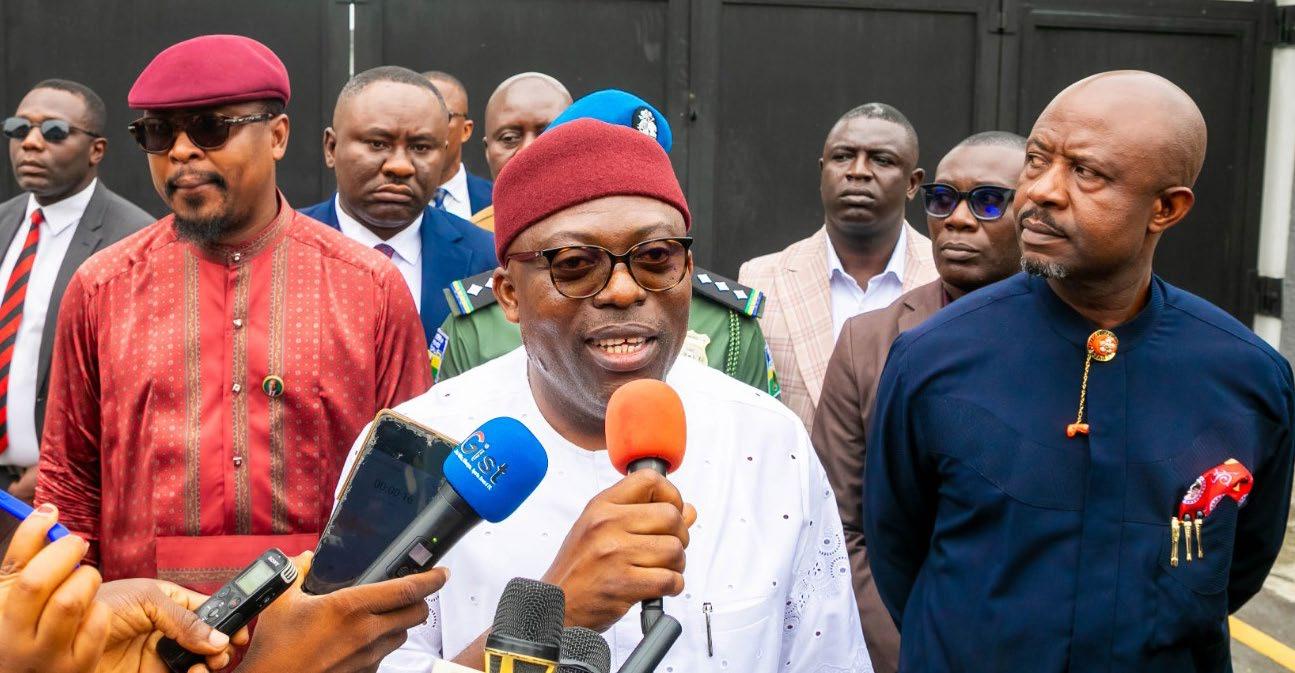
President Bola Ahmed Tinubu has said that he fully understands what Nigerians are going through but that the present economic reform is necessary to build a resilient country and guarantee our children’s future.
The President said this Friday in Abuja when he received the Catholic Bishops Conference of Nigeria (CBCN), according to presidential spokesperson, Bayo Onanuga.
He said President Tinubu highlighted the importance of citizens and leaders investing in the nation to build a strong society. He emphasised that poverty affects everyone regardless of religion and called for collective efforts to fight it. He stressed that the tax reform presented a good investment opportunity for citizens to build their nation.
“Yes, removing the fuel subsidy was hard, tough for me, but it’s a hard choice that Nigeria must face. We are not going to bankrupt our country.
“We were spending the investment of the future of our children yet unborn; We were spending their rights, and poverty has no religious basis. There’s no religious colouration, no identity. It affects all, and we must fight it together,” the President emphasised.
On the request to return mission schools that governments have taken over, President Tinubu said schools are subnational entities, not owned by the Federal Government.
“I’ve been a good example as the governor of Lagos state. I returned to all the mission schools”.
According to Onanuga, President Tinubu commended the Catholic body’s commitment to education and healthcare.
He added that he set up NELFUND to ensure that no student dropped out of school due to a lack of funds for tuition fees. He promised to look at ways to help students of private institutions that NELFUND does not cover.
“We’ve been together for some time. We have an opendoor policy. I will not shut my door.”
The President thanked religious leaders for their prayers, as the country is already witnessing a better deal and a newfound optimism. He highlighted the competition among operators in the petroleum sector, the bountiful harvest enjoyed by farmers, and the lower prices of commodities, adding that investments are flowing into the country.
“There is hope; people are coming in to invest. They are saying good things about Nigeria. I am very proud of that. What seems to be a very difficult beginning is now showing us hope. And we are not at half-time yet. I’m happy to see this period alive and healthy, and I am thankful to all of you for your prayers.
Most Reverend Lucius Iwejuru Ugorji, the Archbishop of Owerri and the CBCN President, who led the delegation of 20 Bishops from across the country, said they were at the State House to congratulate President Tinubu on his victory, having not had the opportunity last year, and to commend him for his efforts to reposition the country and share some concerns.
“Your government’s policy mantra is anchored on the principles of Renewed Hope. In this regard, we are pleased to inform you that the Holy Father, Pope Francis, has declared this year as the year of hope, the Jubilee Year of Hope, a theme we adopted for our conference. We came with the final fruits of our deliberations and will share them with you.”
He said the removal of fuel subsidies had undoubtedly affected the people and commended the tax reform initiative, which he believed would “generate, in the long run, more resources for advancing the common good.”
On religious pilgrimages, the body said that government should hands-off sponsorship to curtail waste and corruption.
“The government should allow religious groups to take full responsibility for organising pilgrimages. In their current structure, the national and state pilgrims’ boards serve neither their adherents nor the broader interest of the nation. You’re undoubtedly aware of the instances of corruption that have led to the removal of some board executives to ensure greater efficiency and accountability.
“We would propose that public funds be redirected towards pressing national needs,” the CBCN President said.
The Minister of Information and National Orientation, Idris Mohammed, who was also at the event, recalled his attendance at the Charismatic Bishop Conference in 2024, emphasising the need for the nation to remain together, to be united, to be focused, and to maintain support for the government, even in the face of temporary hardship.
“It is no news that in any reform that happens in all parts of the world, temporary hardships are usually experienced.
And we’re happy to note that today, not only does the federal government have more money to spend to bring about the kind of promises that the President made at the very beginning, but also to ensure that the future, according to the President, as he always says, the future of our children and the children yet unborn, will not be frittered away.”
President Tinubu noted that the security agencies were already curtailing the nation’s insecurity, stressing that adherents of all religions felt the impact of the efforts.
“This insecurity, everyone is affected, Christians, Muslims alike. I have no religious bias; I won’t be a bigot. My wife is a pastor of Redeemed Christian Church. But we have to think of our country; this country must develop and must stand beyond religious bigotry. And I’m here open to you, ready to listen.
He acknowledged the efforts of security agencies to curtail insecurity in the land. Still, he urged for more concerted efforts to “rekindle hope and inspire confidence in the hearts of our people.”
The Bishops called for a well-defined vision of religion as a force for moral integrity and patriotic unity without necessarily impinging on individuals’ fundamental rights. According to them, “efforts should be made to ensure that religious practice in Nigeria fosters unity rather than division.”
Mohammed said security had greatly improved in the nation. “In 2023, I know how difficult it was to move from Abuja to Kaduna; it is almost impossible just to take your car, fuel it, and begin to go on that road. Today, this is not the case. We know that farmers used to find it extremely difficult to go to the farms. We know that this has not completely gone away, but it is a reality that today, no one asks questions about moving from Abuja to Kaduna or any part of the North.”
He said the national value charter that the President championed in his 2025 New Year message will soon be launched to ensure that Nigerians come together to reclaim our lost values. He added that the National Orientation Agency is working to ensure that both religions teach the Bible and the Quran in our schools and the return of civic education.
The National Security Adviser, Mallam Nuhu Ribadu, also attended the event.




A cross-sections of participants, during the opening ceremony of the 2025 NAF Medical Services Seminar in Abuja on March 12, 2025.


The Pan Niger Delta Forum has accused the Minister of the Federal Capital Territory, Nyesom Wike, of deliberately frustrating efforts to restore peace in Rivers State.
At a press conference held in Abuja on Friday, PANDEF leadership, including its President, Godknows Igali; CoChairman, Board of Trustees, and Chairman of the Forum’s Peace and Reconciliation Committee, Victor Attah, expressed concerns over Wike’s refusal to engage with the committee despite President Bola Tinubu’s appeal for dialogue.
Attah recounted the steps taken by PANDEF to mediate in the political crisis rocking Rivers State, highlighting how Wike had continuously rebuffed their peace efforts.
Attah stated, “Following a Special General Assembly in Port Harcourt in October 2024, we set up a seven-member High-Level Peace and Reconciliation Committee. To ensure neutrality, no representatives from Rivers State were included.
“In our determination to prevent a full-blown crisis, we assembled a team of eminent elders from across the SouthSouth. However, despite repeated attempts, we have been unable to secure a meeting with Chief Nyesom Wike, who has ignored all our outreach efforts.”
Attah further disclosed that a PANDEF delegation had met with President Tinubu on Tuesday to seek his intervention, stressing that the success of any peace process depended on

As the world grapples with the challenges of limited energy access, Nigeria is poised to unlock its vast energy potential and become a major player in the global energy market.
Speaking at the Sustainable Energy for All (SEforALL) Forum in Bridgetown, Barbados where he joined other world leaders, Nigeria’s Finance and Coordinating Minister of the Economy, Mr Wale Edun, called on global investors to partner with the government in unlocking the country’s energy potential. At the very high level gathering, which is focused on advancing global energy, Mr. Edun emphasized the need for strategic investment and greater private sector participation to achieve universal energy access.
The Minister noted that the government alone cannot fund the country’s energy needs. “Our reforms are designed to unlock private investment, improve market dynamics, and accelerate the transition to cost-reflective tariffs”, he stated.

Wike’s willingness to engage. He said, “We made it clear to Mr. President that the biggest obstacle to peace in Rivers State is the reluctance of his cabinet minister to come to the table.
“It is troubling that Chief Wike dismissed PANDEF as ‘the worst organization for anyone to rely on’ in a recent media chat, yet the President himself did not treat us with such disregard when he received us.
“It is impossible to clap with one hand. Negotiation can only happen when both parties in a dispute agree to engage. If this impasse continues, we will have no choice but to disband the Peace and Reconciliation Committee and step back from further mediation efforts. However, we fear this could have dire consequences.”
Wike, during a recent media interaction, had dismissed PANDEF as “the worst organization anybody can rely on,” accusing its leaders of being financially driven and politically motivated.
Reacting, Igali described Wike’s claims as “cheeky and baseless,” noting that PANDEF comprises respected statesmen, including former governors, ministers, and traditional leaders, who cannot be influenced by financial inducements.
“Wike himself is our son, and every son of the Niger Delta is part of PANDEF,” Igali said. He recalled how PANDEF had stood by Wike when he faced opposition over his appointment as FCT Minister.
Nigeria is a key beneficiary of Mission 300, a World Bank and African Development Bank initiative aimed at providing electricity to 300 million Africans. The country is leveraging this initiative to expand renewable energy infrastructure and improve access to underserved communities.
Nigeria’s Minister of Power, Adebayo Adelabu, also attended the forum, reinforcing the country’s commitment to energy sector reforms.
The SEforALL Forum brought together policymakers, development partners, and energy experts to drive solutions for a just and inclusive energy transition.
As Nigeria stands at the threshold of an energy revolution, Mr Edun’s call to action signals a new era of unprecedented growth, innovation, and prosperity for the nation, setting the stage for Nigeria to emerge as a beacon of hope for energy sustainability in Africa.

BY FELIX IFIJEH
The Federal Government of Nigeria has strongly refuted allegations that Christians in the country are victims of targeted killings, describing such claims as misleading and designed to sow discord.
The rebuttal follows a recent report by the Observatory for Religious Freedom in Africa, which alleged that Nigeria accounts for 90 percent of all Christians killed globally each year. The report, presented before the U.S. Congress’ Foreign Affairs Subcommittee on Africa, claimed that between October 2019 and September 2023, over 55,000 people were killed, while an additional 21,000 were abducted by terrorist groups.
Reacting in a statement on Friday, the Acting Spokesperson of the Ministry of Foreign Affairs, Kimiebi Imomotimi Ebienfa, condemned what he described as an attempt to distort the narrative and influence foreign governments, particularly the United States, into designating Nigeria as a “Country of Particular Concern” (CPC).
“The unfortunate development is aimed at wrongly classifying Nigeria by promoting a divisive narrative that misrepresents the security situation in the country,” the statement read.
While acknowledging Nigeria’s security challenges, the government maintained that violence and criminal activities are not religiously motivated, nor are they targeted at any particular group. It further clarified that insurgency and banditry, particularly in the predominantly Muslim northern region, affect individuals of all faiths, stressing that any attempt to frame such incidents as religious persecution is inaccurate and misleading.
“Nigeria is a multi-ethnic and multi-religious nation, and the government remains committed to protecting the lives and property of all citizens, regardless of faith, ethnicity, or gender,” the statement added.
The government emphasised that security threats in the country are complex and multifaceted, manifesting as terrorism, banditry, communal clashes, and farmer-herder conflicts, none of which are driven by religious bias.
It also highlighted the steps taken by the administration of President Bola Ahmed Tinubu to address security concerns, including enhanced military operations, intelligence gathering, and community engagement initiatives.
“The Nigerian military has recorded substantial gains in curtailing the activities of bandits and insurgents. Additionally, both federal and state governments have implemented kinetic and non-kinetic strategies, including the expedited execution of the National Livestock Plan,” the statement said.
L-R: Executive Director, Corporate Affairs, FrieslandCampina WAMCO Nigeria PLC (FCWAMCO), Oreoluwa Famurewa; Former Nigerian Ambassador to Greece, Amb. Opunimi Akinkungbe; Marketing Director, FCWAMCO, Maureen Ifada and Managing Director, FCWAMCO, Roger Adou, during the 2025 International Women’s Day celebration, held at FrieslandCampina WAMCO Nigeria PLC head office in Lagos on March 8, 2025.

BY AMOS OKIOMA
Bayelsa State Governor, Senator Douye Diri, has reaffirmed his administration’s commitment to delivering quality education through the A.S.S.U.R.E.D Prosperity Agenda, emphasizing the importance of science and technology in shaping the state’s future.
Speaking at the Annual Founders’ Day Celebration of Government Secondary School (GSS) Odi, held at the DSP Alamieyeseigha Banquet Hall, Yenagoa, Diri, who was represented by his deputy, Senator Lawrence Ewhrudjakpo, described the event’s theme—Exploring Science and Technological Innovations for Sustainable Social and Political Development—as timely and in alignment with his government’s vision for the education sector.
He stated that his administration places a high premium on science and technology-based education to develop the critical manpower needed to drive industrialization and sustainable economic growth.
On the recent cancellation of a teacher recruitment exercise, the governor explained that it failed to follow due process, necessitating a fresh, properly executed process to align with his administration’s objectives for the education sector.
“As a government, we are deliberately shifting our educational focus towards science and technology, particularly in areas such as engineering and mathematics. This is a strategic move, and we are achieving it by increasing the number of science-based institutions and teachers,” he said.
He also noted that the state had established a Teachers’
Registration Council, a Teachers’ Inspectorate Unit, and the PRIME programme to monitor teachers’ classroom performance.
Diri commended the GSS Odi Alumni Association for giving back to their alma mater and encouraged other alumni groups to play an active role in fostering moral discipline among students.
Chairman of the occasion and Vice Chancellor of the University of Africa, Toru-Orua, Prof. Solomon Ebobrah, emphasised the importance of alumni associations in supporting their former institutions.
Delivering the keynote lecture, Exploring Science and Technological Innovations for Sustainable Social and Political Development, Prof. Franklin Osaisai, a former Director General of the Nigerian Atomic Energy Commission, underscored the critical role of science and technology in national development.
He noted that there is a strong correlation between a country’s development and its advancements in science and technology, warning that Nigeria’s aspirations for national security and sustainable growth would remain a mirage without improved power generation and technological progress.
In his welcome address, the National Chairman of the GSS Odi Alumni Association, Dr. Ebikisei Udisi, said funds raised at the event would be used for the construction of a new science laboratory, renovation of dilapidated structures, and improvement of sports facilities.
BY UDEME UTIP, UYO
Operatives of the Police Command in Akwa Ibom State have intercepted a vehicle carrying firearms during a routine stopand-search operation in Ikot Ekpene Local Government Area.
According to the Command’s Public Relations Officer, Timfon John, officers at the Control Police Post in Ikot Ekpene flagged down a Mercedes Benz C300 with a customized plate number (FORBES JR), during which a locally fabricated firearm and two live cartridges were recovered.
The vehicle had three male occupants, identified as Nsisong Paul Okon, 27, a native of Itak Village, Ikono LGA; Francis Forbes, 62,
of Ikot Akpa Edok Ndiya Village, Ikono LGA; and Prince Forbes, 27, also of Ikot Akpa Edok Ndiya Village, Ikono LGA.
He noted that the operation was part of the Command’s intensified stop-and-search strategy aimed at curbing crime and enhancing public safety. The suspects are currently in police custody, while the Commissioner of Police, CP Baba Azare, has ordered a full-scale investigation into the matter.
Azare reiterated the Command’s zero tolerance for unlawful possession of firearms and reaffirmed its commitment to ensuring the safety of lives and property across the state.
The Operatives of the Nigeria Police Force, attached to Police Mobile Force, 70 Squadron, Kabba at the weekend, foiled abduction of passengers along Ayere road in Kogi state.
In a statement by the Kogi Police Public Relations Officer PPRO, SP William Aya made available to Our Correspondent, indicates that this is consequent upon a distress that some armed hoodlums blocked the road in an attempt to abduct some passengers in a Vehicle.
“On receipt of the distress call, reinforcement teams from Sharper Corner pindown were promptly mobilized and sent to the scene which equally engaged the hoodlums, and owing to the superior fire power of the Police, the hoodlums fled into the bush and abandoned their victims who were rescued by the Police”
The Commissioner of Police, Kogi State Command, CP Miller G. Dantawaye, has ordered the deployment of additional operational and tactical assets of the Command to embark on thorough combing of the surrounding bushes with a view to apprehending the hoodlums and bringing them to deserved justice.
The CP while commending the unwavering dedication by the men of 70 PMF, Kabba, assured the public that the Police will not rest on its oars in the fight against criminality in the State.
Similarly, the Kogi State Director of National Youth Service Corps(NYSC), Mr. Femi Osungbohun has called for increased security presence at the Orientation Camp, Asaya, to ensure the safety of Corps Members in the state.
Osungbohun made the call when he led a delegation of NYSC on a courtesy visit to the Kogi State Commissioner of Police, Miller Dantawaye, at the Command’s headquarters in Lokoja
He said that the call has become necessary as a result of outskirt location of the Orientation Camp at Asaya near Kabba in Kogi state.
“The purpose of our visit is to strengthen security collaboration and ensure the safety of Corps Members in the State” the NYSC Director pleaded.
Osungbohun commended the Nigeria Police Force for its unwavering support in safeguarding Corp Members, particularly through their deployment to Orientation Camp and swift responses to security incidents.
He also called on the Police Command to strengthen patrols around the camp adding that the safety of Corps Members remains our collective concerns.
“We deeply appreciate the sacrifices of the Police Force in securing them. However, given the current security challenges, we seek even more collaboration to prevent any unfortunate incidents.”



President Bola Ahmed Tinubu, (m), members of the Catholic Bishop’s Conference of Nigeria (CBCN) led by Most Reverend Lucius Iwejuru Ugorji, the Archbishop of Owerri during their visit at the Presidential Villa at the weekend.
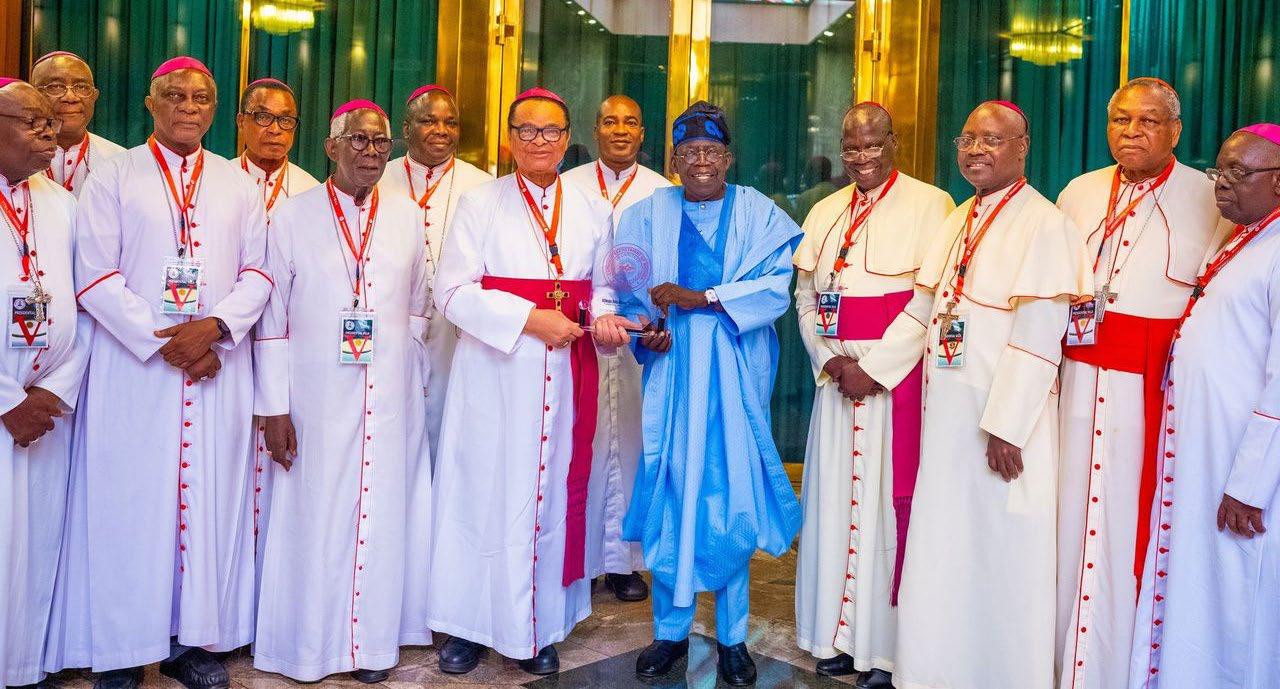
BY FELIX IFIJEH
The Court of Appeal in Abuja has granted a stay of execution on its judgment that upheld the reinstatement of Lamido Sanusi as the 16th Emir of Kano, following the Kano State Government’s repeal of the 2019 Emirate Council Law.
The application for the stay was filed on February 6, 2025, by Aminu Baba Dan (Sarkin Dawaki Babba), who sought an order restraining the Kano State Government, the Speaker of the House of Assembly, the Inspector General of Police, the Nigeria Security and Civil Defence Corps, and other security agencies from enforcing the appellate court’s ruling pending the determination of an appeal at the Supreme Court.
The appellate court had on January 10 set aside an earlier ruling by the Federal High Court in Kano, which nullified the Kano State Emirate Council (Repeal) Law 2024.
Ruling on the application on Friday, a three-member panel
of justices led by Justice Okon Abang declared the request meritorious and deserving of the court’s discretion in the interest of justice.
The court issued a mandatory injunction halting the execution of the judgment and ordered all parties to maintain the status quo as it was before the trial court’s ruling on June 13, 2024, in suit no. FHC/KN/CS/182/2024.
Justice Abang acknowledged the applicant’s legal right to protection, noting that he had served as Emir for five years before his removal.
“In my view, I hold that the balance of convenience lies in his favour. It is deserving to protect him pending the determination of the Supreme Court,” Abang ruled.
The applicant was directed to file an undertaking within 14 days to indemnify the respondents in damages should the order be deemed unnecessary.
BY UDEME UTIP, UYO
1,149
The Nigeria Customs Service (NCS) has intercepted 1,149 jerrycans of Premium Motor Spirit (PMS), allegedly smuggled through the Dorofi and Kan Iyaka axis, along the GembuCameroon border in Taraba.
Comptroller General (C-G) of Customs, Adewale Adeniyi, disclosed this on Friday in Jalingo while auctioning the seized petroleum products to the public. Adeniyi said that the ‘Operation Whirlwind’ which burst the smuggling network was carried out between March 8 and 9, 2025.
He explained that the operation was based on credible intelligence and was done in collaboration with other agencies. He listed the Office of the National Security Adviser (ONSA) and the Nigerian Midstream and Downstream Petroleum Regulatory Authority (NMDPRA) as critical partners towards achieving the success in the anti-smuggling campaign.
“Our intelligence-led operations have disrupted an emerging smuggling corridor along the Gembu-Dorofi-Kan Iyaka-Cameroon border. “We remain committed to ensuring that Nigeria’s fuel does not end up in neighbouring countries illegally at the expense of our economy,” he said. The C-G added that the seized petroleum products, contained in 30-liter jerrycans, totalled about 34 million litres. He said that a special-purpose transportation vehicle valued at N4 million was also impounded, bringing the total duty-paid value of the seizure to over N37 million. Adeniyi noted that the difficult terrain of the area had contributed to the prevalence of smuggling activities.

The Chief Judge of Akwa Ibom State, Justice Ekaette Obot, has ordered the release of 55 inmates across four correctional centers in the state, citing health concerns, prolonged detention, and lack of diligent prosecution.
The mass release followed Justice Obot’s routine visit to custodial facilities across the three senatorial districts, which began on Wednesday, March 12, and concluded on Friday, March 14, 2025.
Breakdown of the release indicates that four inmates regained freedom from the Ikot Abasi custodial center, two from Eket, 11 from Ikot Ekpene, while Uyo correctional center recorded the highest number, with 38 inmates discharged.
During a special court session at the facilities, the Chief Judge reviewed case files and observed that many inmates had been detained beyond the legal limits applicable to their alleged offenses. While some were discharged on compassionate and health grounds, others were freed due to

lack of diligent prosecution.
Addressing the freed inmates, Justice Obot urged them to turn a new leaf and avoid any actions that could lead to their return to custody.
She also expressed concern over missing case files, which have left some inmates languishing in detention longer than their potential sentences if convicted.
“I charge prosecutors to ensure that no one is denied justice or has their fundamental human rights violated due to administrative lapses,” she stated.
The Controller of the Akwa Ibom Command of the Nigerian Correctional Service, Mr. Frank Okonkwo, commended the Chief Judge for her consistent intervention and goodwill towards inmates.
He also highlighted key challenges facing the correctional facilities, including dilapidated infrastructure and lack of logistics for transporting inmates to court.
“The rough landscape is a challenge but we are working towards deploying technology to enhance real-time intelligence and surveillance, which will improve our ability to track and intercept illegal activities,” he said.
The customs boss called on Nigerians to support the service by providing credible information that could aid in tackling smuggling. “We urge members of the public to collaborate with us and other security agencies. Smuggling is an economic crime, and tackling it requires collective effort. “Intelligence gathering and inter-agency collaboration are key to sustaining our fight against this menace,” he said.
Adeniyi reaffirmed the commitment of the service to strengthen border security and to curb the illegal exportation of petroleum products, warning that those involved would face the full weight of the law. Earlier, Controller Garba Bature, Controller of Adamawa/ Taraba Command, said that the command would leave no stone unturned in its fight against smuggling activities.
Bature, while commending the command for its giant strides, sought collaboration from border communities in intelligence gathering. (NAN)

BY FELXI IFIJEH
The viral video on how President of the Senate, Godswill Akpabio struck the gavel that sealed Senator Natasha Akpoti-Uduaghan’s suspension is having the unintended effect of making the public reassess the dramatis personae in the ongoing drama surrounding the six-month suspension of the Senator representing Kogi Central Senatorial District.
In the video, Senator Akpabio had proposed a motion that after Senator Akpoti-Uduaghan’s six months suspension, she would still have to apologise before she might be re-admitted into the hallowed chambers of the Senate.
After the third try, he struck the gavel in favour of the ayes. Expectedly, Nigerians have been making comments and reactions to the video with many changing sides as they deem fit. According to a columnist, Jubril Ibrahim, “He called for the voice vote, and the overwhelming majority said NAY. He decided they did not hear him well and repeated the motion, again, the majority said NAY. The same thing happened the third time when the almighty Senate President decided to announce the ‘Ayes have it’.
“The meaning of this incident is clear. Senators have had their mandate confiscated by President Akpabio and whatever he decides to announce is the absolute law in the upper chamber.”
On her own Senator Akpoti-Uduaghan has refused to back down. She, in fact, escalated to the international scene last week alongside another suit, this time a contempt suit she filed against the Senate President, Akpabio, Clerk of the National Assembly, Chairman of the Senate Committee on Ethics, Priviliges, and Code of Conduct, Senator Neda Imasuen.
THEWILL recalls that Justice Obiora Egwuatu of the Federal High Court in Abuja, on 4 March restrained the Senate Committee on Ethics, Privileges, and Code of Conduct from proceeding with any investigation against the plaintiff/ applicant, while delivering judgement on an ex parte motion filed by Senator Akpoti-Uduaghan through her team of counsels led by Michael Numan, a Senior Advocate of Nigeria.
This investigation related to alleged misconduct following events that occurred during the Senate plenary session on February 20, 2025 and a subsequent referral on February 25, 2025. The court declared that “any action taken during the pendency of the suit is null, void and of no effect whatsoever.”
Still, two days after the court’s ruling, the Senate proceeded to suspend Senator Akpoti-Uduaghan for six months. Responding to the court ruling, the Senate President contested the power of the court to interfere in the internal affairs of the legislature, insisting that the court lacked jurisdiction to intervene in Senate matters.
However, in her contempt charge, Senator Akpoti-Uduaghan argued that her suspension constituted wilful disobedience to the subsisting court order issued on March 4, stating that an enrolled order of the interim injunction issued by Justice Egwuatu was duly served on the defendants on March 5. It warned that defying the subsisting order rendered Akpabio, Senator Imasuen, and the Clerk of the National Assembly liable for contempt of court, which could result in their committal to prison.
Two incidents followed in quick succession in the matter, as regards her problem with the Senate. She had had a heated confrontation with the Senate leadership over a new seating arrangement, which she claimed was designed to undermine her.
Then she alleged on national television that Akpabio had sexually harassed her and was punishing her for rejecting his alleged sexual advances. But she was suspended on March 6. The Senate said she was suspended for violating the House rule and not on allegation of sexual harassment.
According to the Leader of the Senate, Senator Opeyemi
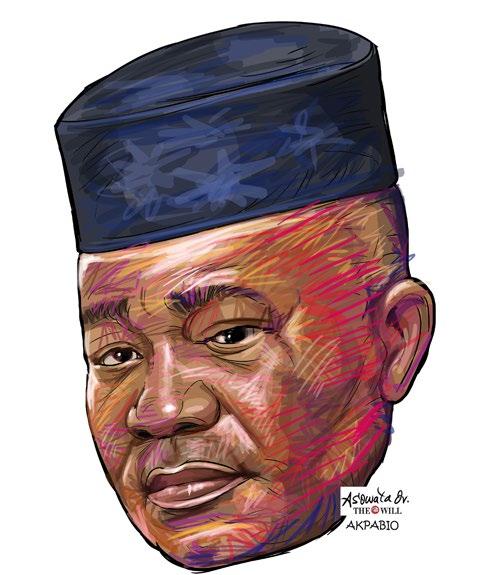
Bamidele, the issue that was refered to the ethics and privileges committee had nothing to do with sexual harassment.
He disagreed with those condemning Akpabio for being a judge in his case, arguing that the public need to understand that the matter before the Senate and on which Akpabio presided over as president had to do with the motion referred to the Senate Committee on Ethics, Privileges, and Public Petition.
“It is not a rule of men, it is a rule of law. It is not about some men trying to gang up against a woman or anybody; it is about ensuring that our rules are respected. That is the only way we can guarantee peace, law and order,” he stated.
Bamidele also clarified the notion held by critics that the Senate had no right to suspend any member. According to the Senate, Akpoti-Uduaghan was found guilty of violating Sections 6.1 and 6.2 of the Senate rules, which led to her suspension.
“If Akpoti-Uduaghan had strictly followed its guiding principles, the Senate would have treated her petition based on merit, in line with its practice, noting that she never obeyed the established practices of the institution where she was serving,” Bamidele said.
Undaunted, Senator Akpoti-Uduaghan took her case to a United Nations forum, International Parliamentary Union, where she made an allegation of political victimisation. Akpabio’s endorsement comes barely 48 hours after AkpotiUduaghan escalated her dispute with Akpabio presenting Speaking at the Women in Parliament session during the Inter-Parliamentary Union meeting at the United Nations in New York, last Wednesday, Akpoti-Uduaghan called for international intervention to hold the Nigerian Senate accountable.
She further decried stringent conditions imposed on her, including withdrawal of security, salary cuts, and a ban from the National Assembly for six months. Rising swiftly to her report, the Nigerian Senate had defended its decision to suspend Akpoti-Uduaghan before the Inter-Parliamentary Union. It maintained that she was suspended for misconduct and not sexual harassment.
Speaking before the IPU, the Chairperson of the House Committee on Women Affairs and Social Development, Kafilat Ogbara, who said she was mandated by the Nigerian Senate to respond to claims made by Akpoti-Uduaghan, said, “Such allegations demand a thorough, impartial and transparent investigation. At the same time, we must ensure that fairness is upheld for all individuals involved and that justice is neither

predetermined nor one-sided.
“Nigeria remains firmly committed to upholding women’s rights and combating gender-based violence through strong legal frameworks and institutions. Our Parliament and Judiciary continue to undergo reforms to strengthen these efforts.
“The ongoing legislative initiatives seek to address historical imbalances in women’s representation in our Parliament, including the Reserve Seats Bill and other crucial proposed constitutional amendments aimed at safeguarding the rights and privileges of women. These efforts underscore our commitment to fostering a more inclusive and equitable political space.”
“Let it be unequivocally stated that Senator Uduaghan was suspended solely for her persistent act of misconduct and disregard for the Senate Standing Orders.” “I want to call on the IPU, not to be coaxed to do anything that will diminish the status of the parliament as the bastion of democracy. IPU should not succumb to being used as an instrument of blackmail against a national institution of parliament.” Adeola stated.
On Thursday, the Senate passed a vote of confidence in Senator Akpabio. Meanwhile, the Federal High Court in Abuja has adjourned the Senator Akpoti-Uduaghan suit to March 25, 2025. The court adjourned over submission by the respondents that they had not been served with the necessary documents.
“
The Federal High Court in Abuja has adjourned the Senator AkpotiUduaghan suit to March 25, 2025. The court adjourned over submission by the respondents that they had not been served with the necessary documents























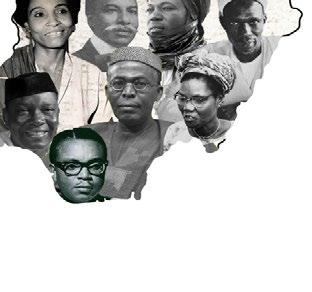















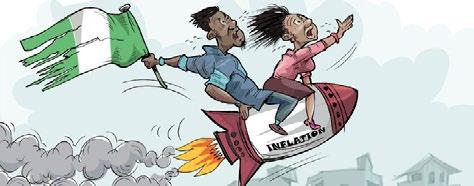


Center Spread Half Page N1, 300, 000
Double Spread N1, 550, 000

Double Spread Half Page N1, 200, 000
10X6 N700, 000
10X5 N650, 000
10X4 N600, 000
10X3 N500, 000
9X6 N440, 000
9X5 N395, 000
9X4 N335, 000
9X3 N310, 000

8X6 N410, 000

8X5 N380, 000
7X5 N320, 000
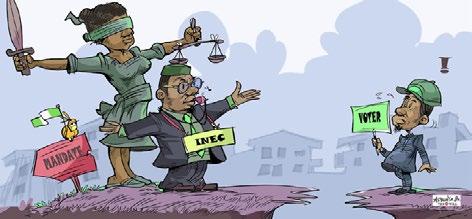



7X4 N315, 000
6X5 N280, 000

6X3 N145, 000
6X2 N85, 000
5X2 N70, 000
4X4 N160, 000
4X3 N95, 000
4X2 N65, 000
3X3 N60, 000
3X2 N50, 000
2X2 N30, 000
2X1 N15, 000
1X1 N7, 000
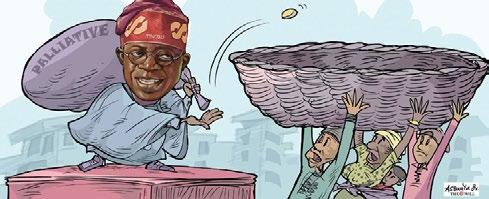
























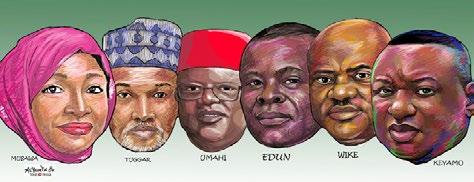

TThe question to be asked is this. Does every police station have a legal desk as recommended in the ACJA? It is possible, just for the asking, that top police officers have not acquainted themselves with this requirement in the ACJA.? What about obedience to the affirmations of the Federal High Court and ECOWAS courts? This is the time to act on the law
“
he recent directive by the Inspector- General of Police, Kayode Egbetokun, to police operatives to stop parading criminal suspects a few days after the Police headquarters in Abuja had done so, is not just self-indicating but also a harsh reminder of the old saying that habits die hard. This inhuman treatment of suspects is at the heart of the Administration of Criminal Justice Act of 2015.
Yet on February 4, 2025, 10 years later, the Nigeria Police Force paraded several suspects arrested in possession of assault rifles, including a shocking case involving a Reverend Father. In a video shared by TVC, the Police Force Public Relations Officer, ACP Olumuyiwa Adejobi, expressed surprise while addressing journalists about the recovery of an assault rifle from the Reverend Father.
According to the station, Adejobi, who paraded the suspects, remarked “that as an educated individual and a religious leader, the Reverend Father should have been aware of the legal and ethical implications of possessing such a weapon.” That is the sorry sight you witness of television regularly across police commands in the country.
It is a sad commentary on the practice of rule of law in the country that it had to take a directive in February this year from Lateef Fagbemi, SAN, Attorney-General of the Federation and Minister of Justice to the IGP to the practice before sanity is, hopefully, to prevail.
However, the Chief Justice of Nigeria, Justice Kudirat Kekere-Ekun had spoken on the same subject before the AGF did. That was when she, in January this year, reportedly stressed the importance of adherence to the Administration of Criminal Justice Act 2015,” particularly provisions prohibiting arrest in lieu, inhumane treatment of suspects, and the mandatory electronic recording of confessional statements.”
She reminded the police that under Section 7 of the ACJA, it is illegal to arrest family members or associates in place of a suspect. She called for internal disciplinary measures within the Nigeria Police Force to ensure that personnel do not engage in unlawful practices.
As Femi Falana, a Senior Advocate of Nigeria, has noted, five previous judgements by Federal High Courts and ECOWAS court had affirmed that the parade of criminal suspects is unlawful.
He said, “The public parade of suspects violates the fundamental right to the presumption of innocence guaranteed by Section 36 of the Nigerian Constitution and Article 7 of the African Charter on Human and Peoples’ Rights.”
The question to be asked is this. Does every police station have a legal desk as recommended in the ACJA? It is possible, just for the asking, that top police officers have not acquainted themselves with this requirement in the ACJA.? What about obedience to the affirmations of the Federal High Court and ECOWAS courts? This is the time to act on the law.
To underscore the impunity with which the provision in the ACJA has been violated serially, recall that the only seven States have domesticated the Act. They are Anambra, Ekiti, Ondo, Enugu, Lagos, Oyo, and Rivers. The F.C.T is automatically included under federal administration.
Yet, Police Commands in all these states have been parading suspects recklessly.
For example, Governor Babajide Sanwo- Olu signed the Administration of Criminal Justice (Amendment) Law (ACJL) of Lagos State on September 30, 2021.
The provisions in the law also include conducting criminal proceedings through audio and video conferencing platforms, powers of Chief Magistrate to visit police stations, compensation to victims of crimes,
and protective measures for victims and witnesses.
Interestingly, on Tuesday, February 11, 2025, the Attorney-General of Lagos State and Commissioner for Justice, Lawal Pedro, SAN, lamented at an event that, “one of the major challenges is the non-compliance with Section 9a (of ACJL) by security agencies; the law states that no suspect should be paraded on media; there are reasons for this, for example, in cases where the court finds the suspect not guilty and acquits him, what becomes of him.?” He added that the state is still making “efforts to ensure that police officers conduct proper investigation and video, including recording statements by suspects at the station upon arrest or in presence of a lawyer.”
Similar scenarios are playing out in the seven other ACJL compliant states, not to talk of states that are yet to implement the Act.
How the new IGP directive intends to implement this directive is yet to be seen. Recall that Spokesperson ACP Adejobi even said the directive had been previously sent to police formations across the country, yet the barbaric practice goes on.
For full compliance, we call on the relevant authorities to embark on a massive public awareness campaign and to rise swiftly to the occasion by prosecuting erring police operatives found breaking the law.
An enlightened public is always difficult to manipulate or deceive, at least in matters affecting their rights. And police officers’ sanction for disobeying the directive would serve as a deterrent to others.
Moreover, we urge states that are yet to implement the ACJA to do so and ensure that they walk their talk. The relevant CSOs and the media, we urge, should bring their reportage and monitoring skills to bear in seeing that the new directives by the AGF, the CJN and the IGP are implemented without further delay.
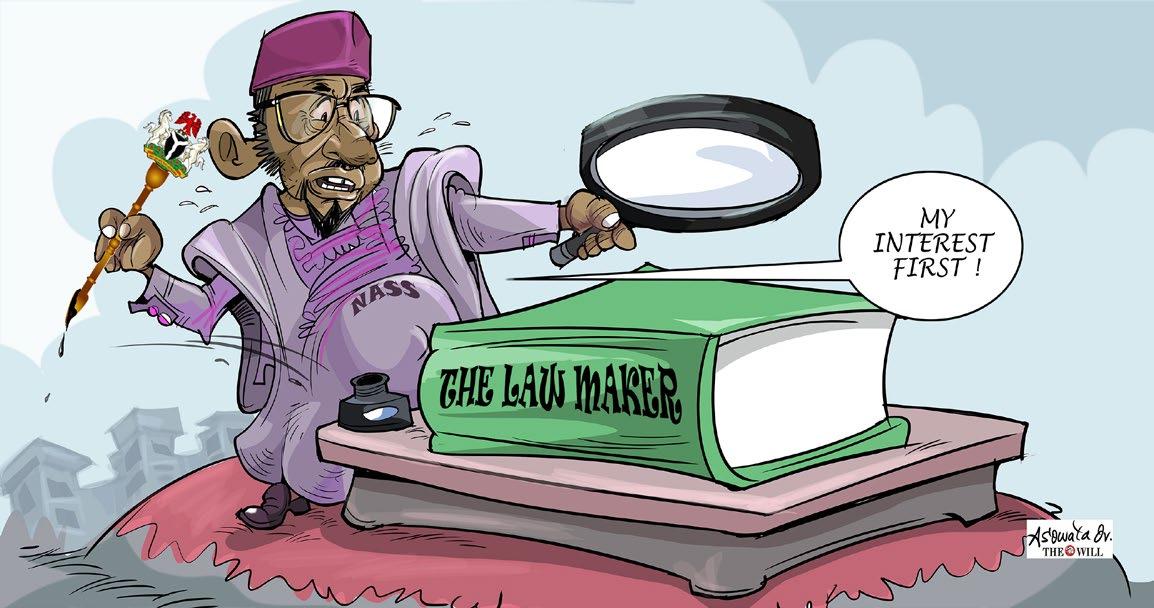





BY OSITA CHIDOKA
Security is the foundation of economic growth and societal stability. Without it, commerce falters, trust erodes and communities disintegrate. In Nigeria, where kidnapping has become an industry, the search for a sustainable security model is urgent.
According to SBM Intelligence, between July 2023 and June 2024, Nigeria recorded 1,130 kidnapping incidents, with 7,568 victims. Kidnappers demanded a staggering N10.99 billion in ransom, but received N1.05 billion—a fraction of their demands, highlighting the growing desperation of criminal networks.
While the North-West geopolitical zone remains the epicentre of Nigeria’s kidnapping crisis, the South-East recorded 240 kidnapping incidents, the lowest of any region in Nigeria, as reported by the NBS Crime Survey, 2024. Anambra state accounted for 29 of these incidents, with 46 victims, placing it among the states with lower overall cases in Nigeria.
However, despite its relative safety, Anambra has become a prime target for criminals due to the high success rate of ransom payments. In one striking case, abductors demanded N300 million but ultimately received N350 million. This paradox presents a harsh reality: criminals go where the money flows.
Nigeria’s security challenge is exacerbated by chronic underfunding of law enforcement. The country’s 2025 police budget translates to $3.43 per capita, rising from $2.60 in 2024. Nigeria’s police budget, compared to South Africa’s $100.12 per person, is 28 times more, while Egypt’s $16.60 per capita is five times more than Nigeria’s police spend.
This comparison tells a disturbing story and reveals a deep funding problem. Nigeria’s police force is severely under-resourced compared to global standards.
The inadequacy of conventional policing necessitates an urgent rethink.

and religious institutions.
The law mandates tenant registration, requiring landlords to document and report the identities of those living on their properties. Town unions must submit monthly security reports or risk losing government recognition, effectively making communities accountable for tracking suspicious activities. Hotels and short-let apartments must register all guests and install surveillance systems. Religious institutions found complicit in criminal activities face closure, while properties used for crime will be seized, with their owners facing up to 25 years in prison. Even supernatural fraud—money rituals and charms for wealth—is now a criminal offence, carrying a six-year prison sentence and a hefty fine.
SOCIETIES THAT TOLERATE MINOR INFRACTIONS CREATE AN ENVIRONMENT WHERE LARGER CRIMES FLOURISH. FRAUD FUELS IMPUNITY. KIDNAPPING FINANCES MORE SOPHISTICATED CRIMINAL ENTERPRISES
Governor Charles Soludo of Anambra State, a former Central Bank of Nigeria governor and renowned economist, has introduced a bold and controversial response. The Homeland Security Law 2025 is a radical shift from conventional policing, embedding security within governance, morality and civic duty. Unlike Nigeria’s traditional approach, which places the entire burden on the police and military, Soludo’s model extends responsibility to landlords, town unions, businesses
This approach represents a fundamental departure from Nigeria’s historically reactive security framework. It acknowledges that policing alone cannot solve a problem rooted in cultural, economic, and social dysfunction.
Soludo’s security doctrine argues that crime thrives because of weak law enforcement and a more profound moral crisis. He has identified three corrosive forces driving crime: a culture that glorifies instant wealth (‘something for nothing’), a societal shift toward materialism at the expense of integrity and the moral ambivalence of institutions that should serve as society’s ethical compass. His argument is difficult to ignore.
In a society where fraudsters are celebrated, religious institutions bless unexplained wealth and communities embrace criminals as benefactors, no surveillance cameras or artificial intelligence-driven crime mapping can ensure security. No police force, no matter how well-equipped, can protect a people who refuse to hold themselves accountable. Security, Gov. Soludo insists, is as much a question of values as enforcement.
History provides valuable lessons. Once plagued by crime and corruption, Singapore became one of the safest countries in the world through strict law enforcement, economic opportunity and a societal commitment to order. At independence, the city-state was overrun with gangs and illicit trade, much like parts of Nigeria today. The government’s response was swift and uncompromising: it introduced zero tolerance for economic and violent crimes, embedded discipline into governance and institutionalised
BY PRINCE CHARLES DICKSON
Diego Maradona's "Hand of God," a moment of audacious deception and divine attribution, remains etched in the collective memory of football. It’s a story that transcended the boundaries of a simple sporting event, becoming a cultural touchstone, a symbol of cunning and controversy. The replay, the analysis, the debate – all contributed to the solidification of this moment into a piece of history, albeit a contested one. In Nigeria, we yearn for such clarity, such a tangible, debated, and ultimately understood narrative of our past.
Our historical landscape is cotton woven with threads of omission, selective memory, and a profound reluctance to confront the more painful chapters of our national story.
The systematic removal of history from secondary school curricula, a decision that effectively severed a generation from its roots, speaks volumes about our discomfort with our past. This deliberate erasure has created a void, a chasm where a shared understanding of our nation's journey should reside.
The prioritiSation of foreign empires, like the Songhai, over the intricate and complex story of Nigerian history further compounds this issue. While these external narratives offer valuable perspectives, they cannot replace the fundamental need to understand our internal dynamics, our struggles, and our triumphs. The absence of a comprehensive exploration of the "Nigerian empire," whatever form it may have taken, leaves a critical gap in our understanding of our own identity.
The Nigerian Civil War, a brutal and deeply divisive conflict, stands as a stark example of our reluctance to confront our past. The persistent refusal to commission a televised narrative, a project that could have served as a powerful tool for healing and reconciliation, underscores our collective unease. The parallels with "Hotel Rwanda" and "Sometimes in April," films that dared to confront the horrors of genocide, are undeniable. By shying away from our painful truths, we perpetuate a cycle of misunderstanding and mistrust.
The Jos September 21 crisis, a more recent but equally devastating event, suffers from a similar lack of comprehensive documentation and public discourse. The absence of a clear, accessible narrative leaves the wounds of this tragedy festering, hindering the process of healing and reconciliation. Without a shared understanding of these events, we are condemned to repeat the mistakes of the past.
Equally troubling are the unresolved controversies that look like specters over Nigeria’s political history. The 1986 assassination of Dele Giwa, founder of Newswatch magazine, via a letter bomb remains a festering wound. Despite evidence implicating state actors, the case languishes in obscurity, buried under layers of official obfuscation.
Similarly, the 2001 murder of Bola Ige, then-Attorney General and Minister of Justice, remains shrouded in mystery. The unanswered question of who killed Bola Ige has become a metaphor for the culture of impunity that haunts Nigeria’s corridors of power. These are not mere cold cases; they are testaments to a state’s refusal to confront its shadows.
WE ARE IN A COFFIN, WHERE YOUNG NIGERIANS EXHIBIT A PROFOUND DISCONNECTION FROM THEIR HISTORICAL HERITAGE AND CULTURAL ROOTS, REFLECTING A BROADER SOCIETAL SHIFT AWAY FROM THE COLLECTIVE MEMORY AND TRADITIONS THAT ONCE DEFINED THEIR IDENTITY
This opacity extends beyond individual tragedies. The Nigerian state’s insistence on classifying vast swathes of historical records—often under the guise of “national security”—denies citizens access to their own story. While democracies like the United States declassify documents after set periods, Nigeria’s archives remain locked, fueling speculation and conspiracy.
What truths lie hidden in files marked confidential? What role did the state play in pivotal moments like the annulment of June 12 or the fuel subsidy protests? By clinging to secrecy, the state reduces history to a weapon, wielded to control narratives rather than enlighten the public. Compounding this is the relegation of national discourse to the realm of myth and rumor. Without official records, history becomes a battleground of competing anecdotes. Was MKO Abiola’s death natural or engineered? What truly transpired during the Dimka coup? In the absence of facts, hearsay thrives. The danger is not merely academic; it erodes trust in institutions and fractures collective memory. When history is negotiable, manipulated by those in power, or concocted in the echo chambers of social media, society loses its anchor. A nation
Unity Bank Hosts IWD Webinar, Commits to Accelerating Action Towards Gender
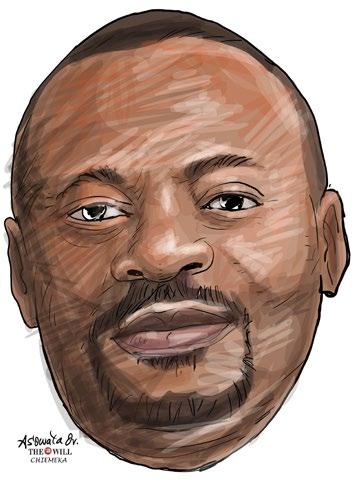
The insurance, brewery and banking sectors dominated the stock market volume transactions during the week ended March 14, according to data by the Nigerian Exchange Limited (NGX) as investors’ sentiments continue to drive activities in the local bourse. Trading in the top three equities namely Sovereign Trust Insurance Plc, Champion Breweries Plc and Jaiz Bank Plc (measured by volume).
They accounted for 1.621 billion shares worth N3.244 billion in 1,528 deals, contributing 49.42 per cent and 5.11 percent to the total equity turnover volume and value respectively.
A total turnover of 3.281 billion shares worth N63.517 billion in 60,782 deals was traded last week by investors on the floor of the Exchange, in contrast to a total of 1.818 billion shares valued at N47.226 billion that exchanged hands the previous week in 64,222 deals.
The Financial Services Industry (measured by volume) led the activity chart with 2.302 billion shares valued at N25.014 billion traded in 27,625 deals.
Consequently, they contributed 70.17 percent and 39.38 percent to the total equity turnover volume and value, respectively.
The Consumer Goods industry followed with 421.846 million shares worth N3.796 billion in 6,149 deals. Third place was the Services Industry, with a turnover of 228.075 million shares worth N800.274 million in 4,741 deals.
The NGX All-Share Index and Market Capitalisation depreciated by 0.55 per cent to close the week at 105,955.13 and N66.352 trillion, respectively. The performance represents an overall year-to-date gain of 2.94 percent.
Analysts at Cordros Securities project market sentiments to be shaped by investors’ reactions to the forthcoming February inflation report.
EDITOR Sam Diala
In a stunning outcome of events, the value of Nigeria’s agricultural goods exported in the fourth quarter of 2024 exceeded that of the imported category during the period. And this is historic.
Data from the National Bureau of Statistics (NBS) show it was the first time in verifiable records that agricultural exports would exceed the imported side in Nigeria’s foreign trade reports.
The NBS in its latest ‘Foreign Trade in Goods Statistics’ report disclosed that the value of agricultural goods imported in Q4 2024 was N1.09 trillion. This reflects a remarkable increase of 53.35 percent, compared to N711.14 billion in Q4 2023 and an increase of 23.61 percent, hi when compared to N882.24 billion in Q3 2024.
On the flipside, exports of agricultural goods in the review period amounted to N1.54 trillion representing a whopping 232.02 percent rise from N463.97 billion in Q4 2023 and a 72.95 percent increase from N890.72 billion in Q3 2024.
Put together, the total value of trade in agricultural goods in Q4 2024 stood at N2.63 trillion, compared to N1.17 trillion in Q4 2023 – an increase of 124.7 percent.

While the value of agric exports and imports stood at N1.54 trillion and N1.09 trillion, respectively, in Q4 2024, the figures for Q4 2023 were N711.14 billion and N463.97 billion, reflecting a significant impact of the devaluation of the naira on export trade.
The Central Bank of Nigeria (CBN) on June 14, 2023. announced the unification of the multiple foreign exchange market which sparked a massive devaluation of the naira from N472/US$1 in the official window on the previous day (June 13) to N665/U$1. The parallel market rate, prior to the devaluation, was N769/US$1. That triggered the continued downturn i n naira’s value that rendered it one of the worst performing currencies at various times.
The naira closed at N1,567.28/ US$1 in the official forex window on Friday, March 14, 2025 reflecting a loss of N1,096 within 21 months of devaluation of the domestic currency.
The parallel market rate closed at N1,570/US$1 last Friday.
The CBN Governor noted that the naira’s devaluation had made it more competitive for the export trade, with many investors already seizing the opportunity.
Cardoso acknowledged that while the situation is not ideal, the current climate offers a chance for individuals to identify and pursue investment opportunities.
“In terms of persuasion, what we need now is to ensure that investments are here. For example, now it may seem like a threat in a sense that the exchange rate has come down so low. But that also is an opportunity because it can help to boost exports.
“This will make Nigeria become a lot more competitive in the export trade. I just want to encourage people to see that the opportunities are here. Things are recalibrating in a particular direction. It’s not perfect, but definitely there are opportunities for people to single out and invest.
“By the time you are exporting out to other countries with the cost of import here and the relatively low naira, you will have a situation where the demands for your goods increase. And I see it happening. Others are doing it and the interest is growing in leaps and bounds,” Cardoso said.
The NBS listed the major agricultural export items as cocoa, sesamum seed and cashew nuts. According to the report, ‘Quality cocoa beans’ valued at N836.23 billion, ‘Standard quality Cocoa beans’ N269.34 billion and ‘Sesamum seeds’ N202.94 billion were exported.
“Looking ahead, we expect market sentiment to be shaped by investors’ reactions to the February inflation report expected next week, and direction of yields in the fixed income market. “However, we do not rule out potential bargain-hunting in some banking names, as recent selloffs suggest attractive re-entry opportunities,” they said in a note to their clients last Friday.
Economists say devaluation makes imports more expensive and exports cheaper. While the huge loss of value in the naira is not a positive phenomenon, the CBN emphasises that a weak naira is an opportunity for Nigeria to boost its export trade
Speaking at the Nigerian Economic Summit in Abuja in October, 2024, the Governor of the Central Bank, Yemi Cardoso, stated that the sharp drop in the value of the naira presents an opportunity for the country to boost its exports to other nations.
WHILE THE VALUE OF AGRIC EXPORTS AND IMPORTS STOOD AT N1.54 TRILLION AND N1.09 TRILLION RESPECTIVELY IN Q4 2024, THE FIGURES FOR Q4 2023 WERE N711.14 BILLION AND N463.97 BILLION RESPECTIVELY, REFLECTING A SIGNIFICANT IMPACT OF THE DEVALUATION OF THE NAIRA ON EXPORT TRADE
Others are ‘Natural cocoa butter’ valued at N104.59 billion, and ‘Cashew nuts shelled’ with N30.76 billion.
The data showed that the agricultural products were mainly exported to Europe at N986.70 billion, followed by exports to Asia, valued at N474.38 billion. Further analysis showed that ‘Superior quality cocoa beans’ worth N477.95 billion and N108.09 billion were exported to The Netherlands and Malaysia, respectively.
Similarly, ‘Standard quality cocoa beans,’ worth N110.84 billion and N48.96 billion were exported to The Netherlands and Belgium respectively. Similarly, ‘Sesamum seeds’ worth N96.71 billion and N32.29 billion were exported to China and Japan, respectively.
On the other hand, the major agricultural goods imported in Q4, 2024 included ‘Durum wheat’ from Latvia and Russia




valued at N69.80 billion and N58.27 billion, respectively.
This was followed by ‘Jack and horse mackerel (Trachurus spp.) meat, frozen.’ valued at N66.18 billion from Chile.
“Nigeria can do far better than this if the government pays sincere attention to agriculture and agribusiness. We are here battling with insecurity, electricity and poor road networks across the country. These impact negatively on agriculture and agribusiness and worsen the already challenging business environment.
“Our leaders look the other way, jumping across the globe combing for foreign investors as if the international community does not know we are not serious people,” said Gabriel Onosanya, an agribusiness expert.
According to Onosanya, agriculture is not faring well in our GDP outlook mainly because of these negative phenomena.
The agricultural sector in the fourth quarter of 2024 grew by 1.76 percent (year-on-year) in real terms, a decrease of 0.35 percent points from the corresponding period of 2023 and an increase of 0.61 percent points from the preceding quarter which recorded a growth rate of 1.14 percent. It grew on a quarter-on-quarter basis at 0.38 percent.
Overall, annual growth of the agric sector stood marginally at 1.19 percent in 2024, compared to 1.13 percent in 2023. In terms of contribution to GDP, the sector contributed 25.59 percent to aggregate GDP in real terms in Q4 2024, lower than the contribution in the fourth quarter of 2023 and lower than the third quarter of 2024, which stood at 26.11percent and 28.65 percent, respectively. The overall contribution in 2024 was 24.64 percent from 25.18 percent in 2023.
Agriculture is also the weeping child of Nigeria’s high rate of inflation. Nigeria’s inflationary outlook has undergone a significant shift, following the recent rebasing of the CPI by the NBS. The latest data for January 2025 shows headline inflation reactions at 24.48 percent, a sharp 10.32 basis points decline from December 2024’s 34.80 percent.
The NBS maintains that the surge in food inflation continues to challenge the economy with firms shutting down over high operation costs while households experience steep drop in living standard spiked by high cost of living.
The NBS also explained that worsening insecurity across
Unity Bank Plc has reaffirmed its commitment to women’s empowerment with a series of highimpact initiatives designed to inspire action toward gender equality and sustainable development.
The Bank hosted a webinar with the theme: “Unleashing Women’s Potential,” pivoted by the Unity Bank Women Network as it was marking this year’s International Women’s Day,

Being one of the Bank’s thought leadership on self-reliance, opportunity and equity, the webinar featured influential female leaders, including Gbemi OlateruOlagbegi, a Nigerian entrepreneur and media personality, and Oluwabusayo Adegoke, a certified life coach and Strategy Consultant, who shared perspectives on women’s leadership, financial inclusion, and breaking barriers in male-dominated industries. The event provided an opportunity for professionals, entrepreneurs, and young women to gain valuable insights into personal and professional development.
The Bank also spotlighted women making significant contributions to their communities, particularly those driving change through education, mentorship, and financial empowerment.
Among them were Abisoye Ajayi-Akinfolarin, a trailblazer empowering girls through technology; Tejumoluwa Olaobaju, an advocate leading the fight against period poverty in her community; and Chioma Ohakwe, a champion of inclusivity and women’s empowerment through targeted skill acquisition programmes for girls and women.
Speaking on the Bank’s commitment to gender equity, Mrs. Particia Ahunanya, Unity Bank’s Chief Compliance Officer and Chair of Unity Bank Women’s Network, stated: “Our commitment to financial inclusion and gender equity has made Unity Bank remain in the vanguard of championing opportunities for empowering women across all sectors.
This is in view of the realization that women are crucial drivers of economic growth and societal transformation. Through initiatives like the ‘Unleashing Women’s Potential’ webinar and our community spotlights, the Bank is focused on promoting more

the country, especially in the North which is the nation’s food basket, is behind the high cost of food. It noted that the mass food producing areas of the North have been under the siege of insecurity in the past nine years.
In states like Niger, Benue, Plateau, Borno, Katsina, Taraba and others, the farming communities have deserted their farm lands where they were displaced by bandits, herdsmen, terrorists and kidnappers and they are now living in the internally displaced persons (IDP) camps. Unfortunately, there are no signs that the ugly trend is likely to improve any time soon, given the continued spate of killings and abductions across the country, especially in the food-producing areas of the North, since the beginning of the Bola Tinubu-led Federal Government in May 2023. According to Onosanya, while agribusiness operators are swimming in a huge volume of naira that has last over 70 percent of its value since June 2023, the real impact is the thousands of Nigerian farmers who have deserted their farmlands to live in the IDP camps because of persistent attacks by the herdsmen that terrorize their communities.
initiatives to drive impact among the female gender”.
Unity Bank’s IWD 2025 initiatives align with its broader vision of supporting women in leadership, business, and entrepreneurship. Through gender-focused initiatives - particularly with products like the Yanga Account - the bank is committed to driving financial inclusion and empowering women to actively participate in economic and financial systems.
By providing tailored financial solutions, Unity Bank aims to create equal opportunities for women to thrive, grow, and succeed.
As the global conversation on gender equality continues to gain momentum, Unity Bank calls on stakeholders across industries to accelerate actions toward creating a more inclusive society without limitations.
Concerning its FY 2023 performance, Unity Bank Plc posted gross earnings of N59.3 billion for the full year ended December 31, 2023, representing a growth of 3.84 percent year-on-year.
In its audited financials submitted to the NGX Group Limited, the Bank also witnessed improvements across key performance indicators, including a significant appreciation of customer deposits by 23 percent to N402.9 billion from N327.4 billion within the period under review – an indication of sustained retail growth and customer confidence.
Other key highlights of the full-year results include the total assets which stood at N472.5 billion; net fee and income commission, N5.2 billion and an increase in interest income by 9.6 percent to 53.7 billion from N48.8 billion within the period.
Commenting on the result, the Managing Director/Chief Executive Officer of Unity Bank Plc, Mrs. Oluwatomi Somefun said the Bank had issued a profit alert to reflect revaluation loss arising from naira devaluation which was due to acute shortage of forex that created an inclement business environment and, on the aggregate, set in an economic headwind.
She noted, however, that in the full-year statement, this has bottomed out and the key performance indicators are rebounding from the low level of growth and negative
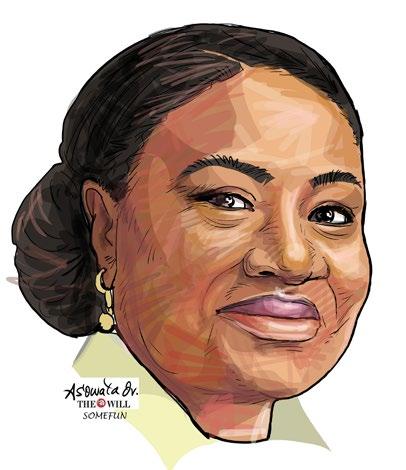
trends that characterized the year.
Mrs. Somefun stated: “As we begin to see the margins being closed, it is an indication that the measures being taken to revamp all aspects of the business is being well received by the market: be it workable recapitalization plan, aggressive drive for asset creation, product innovation, or digital banking”.
“We will need to covet the improvements and further build upon it. As a corporate brand, we have a lot that is keeping us going: the positive sentiments and optimism, the growing franchise of the business and steady growth in different segments of the retail market across all the geo-political zones of Nigeria”, she said.
In a bid to promote a savings culture and enhance financial literacy among young Nigerians, Unity Bank had announced plans to launch a new app for children and teenagers designed to empower users to achieve their financial goals.
The announcement was made during the World Savings Day training held at Emerald Fields School, Calabar, Cross River State, in November 2024 as part of the Bank’s nationwide initiative to mark the global event.
World Savings Day is observed in Nigeria as an initiative of the Central Bank of Nigeria, Bankers Committee and Junior Achievement

Nigeria to drive financial inclusion with the vehicle of Financial Literacy Training which is held in secondary schools across the country.
Speaking at the event, Mrs. Somefun, represented by the Chief Compliance Officer, Mrs. Patricia Ahunanya, emphasized the importance of instilling good financial habits early in life.
She explained that the upcoming app would equip students with tools to set SMART financial goals, understand the power of compound interest, and build financial safety nets through savings and prudent money management.
“Financial literacy is the foundation of a secure future. By teaching students to distinguish between needs and wants, budgeting, and embracing delayed gratification, we empower them to take charge of their financial journeys. The new app will serve as a practical tool to support these lessons and help young Nigerians build a culture of savings,” Mrs. Somefun stated.
The training session in Calabar, one of 16 held simultaneously across secondary schools in Nigeria, aimed to instill essential money management skills. Participants were exposed to simulations on earning, budgeting, spending wisely, and understanding the principles of borrowing and saving. Unity Bank’s representatives guided the students through interactive discussions, encouraging them to set financial goals and cultivate habits that support long-term financial stability.
Unity Bank’s initiative aligns with the CBN’s financial inclusion strategy by encouraging young Nigerians to embrace financial literacy early. The Bank’s upcoming app, designed specifically for children and teenagers, will complement this effort by providing an engaging platform for setting savings goals, tracking progress, and building healthy financial habits.
The Central Bank of Nigeria (CBN) had last August approved the merger of Unity Bank and Providus Bank, with the aim of bolstering the stability of the nation’s financial system and averting potential systemic risks, and the merger is contingent on a N700 billion financial accommodation from the CBN.

BY ADENIKE ODUSANYA
As we mark International Women’s Day on March 8, 2025 it is a good time to spotlight the critical role women play in shaping Africa’s financial future. From business leaders to financial advisors and policymakers, women are actively contributing to the economic transformation of the continent.
However, the success of small and medium-sized enterprises (SMEs)—the backbone of African economies—hinges on one essential factor: financial literacy. The ability of business owners to understand and manage their finances effectively is the difference between a thriving enterprise and one that struggles to stay afloat. Yet, financial clarity remains one of the most significant challenges for SMEs, hampering their ability to secure funding, scale operations, and achieve long-term sustainability.
THE IMPORTANCE OF FINANCIAL LITERACY IN BUSINESS GROWTH
Financial literacy is more than just understanding numbers. It is the foundation of strategic business decisions. In emerging markets like Africa, where regulatory frameworks are evolving and access to capital remains a challenge, financial literacy equips entrepreneurs with the tools to navigate complex economic environments. Budgeting, cash flow management, investment decision-making, and risk assessment are fundamental financial principles that every business owner must master.
Beyond individual business success, financial literacy fosters economic resilience. It enables SMEs to anticipate market fluctuations, adjust to inflationary pressures, and comply with tax regulations, reducing the risk of business failure. More importantly, as financial ecosystems develop across Africa, ensuring that both entrepreneurs and policymakers are financially literate fosters innovation, promotes sustainable business practices, and drives inclusive economic growth.
THE FINANCIAL CLARITY GAPS HOLDING SMES BACK
Despite the well-documented benefits of financial literacy, many African SMEs continue to struggle with financial clarity. One of the most persistent challenges among SMEs is the lack of proper financial record-keeping. Many business owners, despite their innovative ideas, fail to maintain structured accounting systems, making it nearly impossible to track cash flow or secure external funding.
Poor financial planning further exacerbates this issue. Without a clear budgeting strategy, businesses misallocate resources, leading to cash flow crises. Additionally, a lack of risk management leaves SMEs vulnerable to external shocks such as currency fluctuations and economic downturns. Compliance with tax and regulatory requirements also remains a challenge, with many SMEs incurring unnecessary penalties due to inadequate financial knowledge.
THE IMPACT ON FUNDING AND BUSINESS EXPANSION
For African SMEs, access to capital is a constant struggle. Financial institutions and investors rely on accurate financial records to assess the viability of businesses before providing funding. However, the absence of structured accounting and financial reporting creates a trust deficit, making it difficult for SMEs to access loans, attract investors, or negotiate favourable financing terms.
In addition to financial record-keeping, understanding financial planning is crucial for growth.
Businesses that fail to manage their resources efficiently often find themselves in financial distress, unable to scale operations sustainably. Taxation and regulatory non-compliance further deter potential investors, who perceive such businesses as high-risk ventures. Addressing these financial clarity gaps is not just about securing funding; it is about positioning businesses for long-term success.
PRACTICAL STEPS FOR SMES TO IMPROVE FINANCIAL CLARITY
The good news is that financial literacy is a skill that can be developed. Business owners looking to enhance their financial
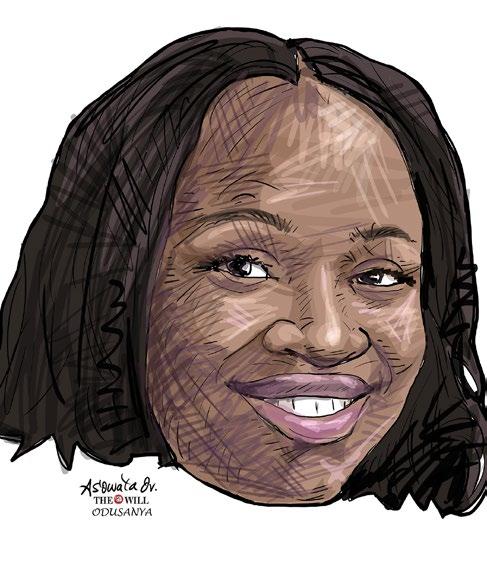
reporting and planning processes can start by implementing structured accounting systems. Using digital tools for bookkeeping and financial tracking ensures accurate record-keeping and provides better financial visibility, making it easier to monitor income, expenses, and cash flow.
In addition, developing a clear budgeting strategy is essential for allocating resources wisely and forecasting financial needs. This helps businesses stay on top of their expenses while preparing for future growth. Regular financial reviews also play a critical role, as periodic assessments enable businesses to identify trends, control costs, and make proactive adjustments to their financial strategies. Ensuring compliance with tax and regulatory requirements is another crucial step. A solid understanding of tax laws and adherence to financial regulations builds credibility with investors and financial institutions, making it easier to secure funding. Finally, seeking professional financial advisory services—whether from consultants or fractional CFOs—can provide expert guidance on risk management, strategic planning, and informed financial decision-making.
THE ROLE OF FINANCIAL ADVISORS IN SME SUSTAINABILITY
Financial advisors play a crucial role in helping SMEs navigate financial complexities. From setting up robust accounting systems to ensuring compliance with tax laws, financial advisors help businesses build a strong financial foundation. By optimising cash flow, monitoring expenses, and refining business models, they position SMEs for sustained profitability.
Risk management is another critical area where financial advisors add value. By guiding businesses in financial forecasting, capital allocation, and emergency planning, they help SMEs mitigate economic shocks. Furthermore, advisors play an essential role in succession planning, business valuation, and structuring operations for long-term continuity.
TRANSFORMATION AND FINANCIAL
In today’s rapidly evolving digital economy, technology is a game-changer for SMEs looking to optimise financial processes. Cloud-based accounting software allows real-time tracking of financial transactions, while digital payment solutions improve cash flow management. Automation of tax compliance and regulatory reporting reduces administrative burdens and minimises errors. Moreover, data-driven financial analytics provide valuable insights into spending patterns, profitability, and risk assessment. By
leveraging these digital tools, SMEs can streamline operations, enhance financial transparency, and improve decision-making. As businesses continue to embrace digital transformation, financial literacy and digital proficiency must go hand in hand.
FINANCIAL TRENDS IN 2025

Looking ahead, several financial trends will shape how SMEs operate in 2025. Increased digitalisation and automation will drive financial efficiency, allowing businesses to make data-driven decisions. ESG (Environmental, Social, and Governance) reporting is also gaining prominence, with investors demanding greater transparency on sustainability efforts.
Alternative financing options, including venture debt, crowdfunding, and private equity, are becoming more accessible, providing SMEs with diverse funding avenues. Additionally, evolving tax policies and regulatory shifts require businesses to stay agile and informed. Partnering with trusted financial advisors will be key to navigating these changes effectively.
WOMEN IN FINANCE: A CATALYST FOR ECONOMIC TRANSFORMATION
It is essential to recognise the role women are playing in transforming Africa’s financial landscape. From leading financial institutions to running successful enterprises, women are driving economic growth, fostering financial inclusion, and advocating for policies that support SME development.
However, challenges remain. Gender biases persist in the finance sector, making it harder for women to access leadership positions and funding opportunities. Yet, the increasing emphasis on diversity, equity, and inclusion (DEI) is creating new pathways for women to thrive. Mentorship programmes, networking initiatives, and targeted funding opportunities are empowering women to take charge of their financial futures.
For women entrepreneurs looking to scale their businesses, financial planning is non-negotiable. Separating personal and business finances, maintaining accurate records, and understanding key financial statements are fundamental to business success. Building an emergency fund, negotiating favourable vendor terms, and exploring diverse funding options can strengthen financial resilience.
Furthermore, investing in financial literacy and seeking professional guidance can enhance decision-making. With smart financial planning, women entrepreneurs can drive profitability, attract investors, and create businesses that stand the test of time.
SHAPING THE FUTURE OF FINANCE IN AFRICA
As women continue to break barriers in finance, their influence is reshaping the industry for the better. By leveraging their unique perspectives, they are creating more inclusive and resilient financial ecosystems. Their contributions to impact-driven finance, sustainable investment, and financial policy reforms are laying the groundwork for a more equitable and prosperous Africa.
•Odusanya is a finance expert

The ability of business owners to understand and manage their finances effectively is the difference between a thriving enterprise and one that struggles to stay afloat

BY KINGSLEY NDUBUEZE AYOZIE
Recently, the media reported a directive issued by the Accountant-General of the Federation (AGF), mandating all Ministries, Departments, and Agencies (MDAs) to embrace the Treasury Single Account (TSA) without hesitation.
According to the release, the Federal Government has directed all MDAs operating in states to close accounts with commercial banks in adherence to the TSA policy. This directive was issued by the Accountant-General of the Federation, Dr. Oluwatoyin Madein, during a working visit to the Federal Pay Office in Benin, Edo State.
Dr. Madein emphasised that no MDA should operate accounts outside the TSA framework unless expressly approved by the President and communicated through the Office of the Accountant-General. She tasked Federal Pay Officers with enforcing compliance and ensuring transparency in financial management.
This directive appears to be part of the government’s strategy to combat corruption and embezzlement while blocking financial leakages and wastages. Ultimately, it aims to promote the effective management of public finances through the TSA policy.
The Treasury Single Account (TSA) is a unified structure of government bank accounts that provides a consolidated view of government cash resources and financial position at any given time. The Federal Government of Nigeria (FGN) introduced the TSA on September 15, 2015, with the objective of consolidating all inflows (receipts) from MDAs into a single account at the Central Bank of Nigeria (CBN). This is done through designated deposit money banks (DMBs), ensuring that all government revenues are traceable and accounted for in one central system.

Abiodun (2018) described the TSA scheme as an electronic public cash flow management platform, recommended by the International Monetary Fund (IMF), designed to track all receipts, payments, and balances of public funds across MDAs. This system highlights the consolidated daily cash balance in the government’s treasury at the close of each banking day, with the CBN or an appointed institution serving as the administrator.
From all indications, the TSA scheme is a key measure in the fight against corruption, serving as a critical tool for ensuring accountability, transparency, and a significant
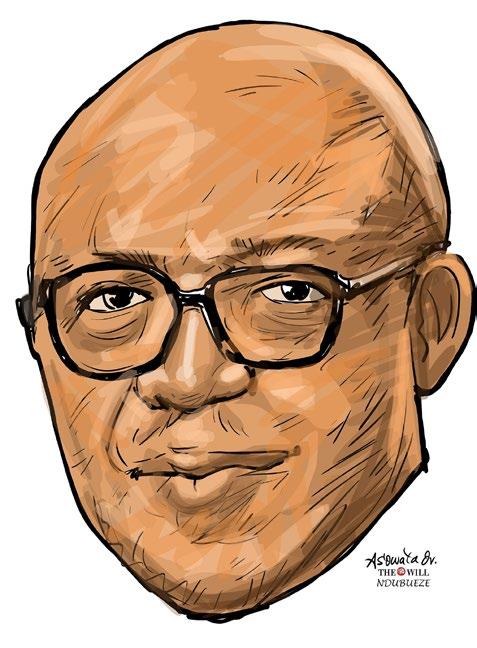
reduction in the cost of governance. Additionally, it forms an essential part of public financial management reforms under pillar three of the National Strategy for Public Service.
The TSA is instrumental in consolidating and managing government cash resources, thereby minimising borrowing costs. It aims to reduce the proliferation of multiple bank accounts operated by MDAs and to guarantee financial accountability and transparency within government institutions.
The Federal Government of Nigeria embraced the TSA scheme to harmonise all government bank accounts into a single structure, ensuring close monitoring of all government revenues. This policy eliminates unnecessary or multiple bank charges resulting from duplicating government accounts in different banks, promotes accountability and transparency within and outside MDAs, and reduces financial mismanagement by addressing leakages, wastages, and embezzlement of public funds. Furthermore, the scheme provides the government with an accurate daily cash balance, facilitating better budget planning and forecasting.
A key feature of the TSA policy is its ability to provide a comprehensive and consolidated view of government revenue, discouraging the duplication of accounts. It also functions
as a unified banking arrangement that closely monitors all government inflows and outflows within a given period.
If implemented effectively and without compromise, the TSA scheme promises to prevent revenue leakages, ensuring improved transparency and accountability in governance. Operational control is enhanced through efficient cash management, while unnecessary bank charges resulting from multiple accounts are eliminated. More importantly, the scheme plays a vital role in combating corruption and financial mismanagement.
Despite its many benefits, the TSA scheme is not without challenges. One major issue is the administrative bottlenecks associated with maintaining a single government account. Additionally, there is resistance to change from some government functionaries who are reluctant to embrace the new system. Some critics argue that the TSA scheme is restrictive because it primarily focuses on government revenues and expenditures while neglecting other financial variables.
The TSA scheme remains a crucial instrument in Nigeria’s pursuit of financial prudence, accountability, and transparency. While challenges exist, its implementation can significantly improve the efficiency of public financial management, reduce corruption, and ensure better allocation of government resources. If executed rigorously and without compromise, the TSA policy will serve as a powerful antidote to financial mismanagement in Nigeria’s public sector.
•Ayozie is a chartered accountant and public affairs analyst
The Federal Government of Nigeria embraced the TSA scheme to harmonise all government bank accounts into a single structure, ensuring close monitoring of all government revenues
Photo Editor: Peace Udugba [08033050729]

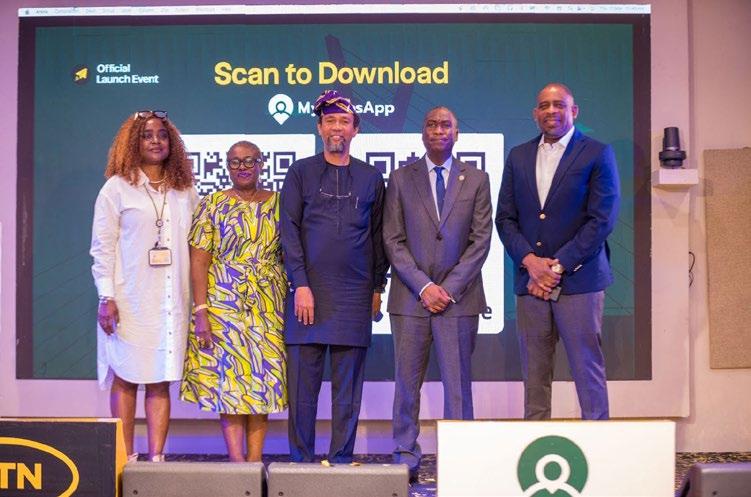
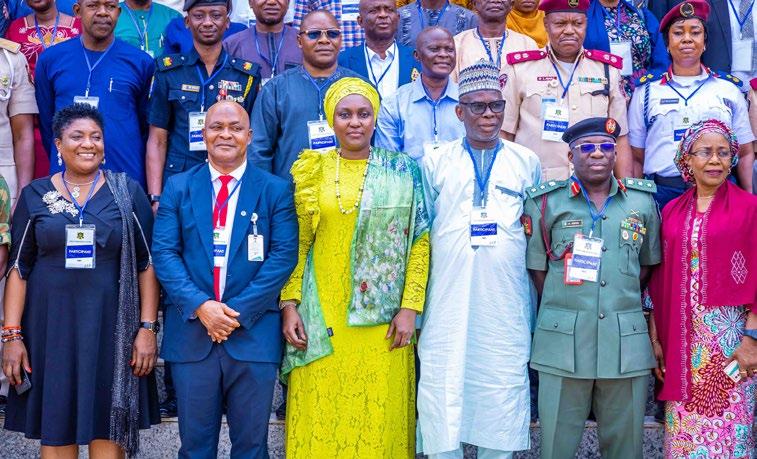
L-R: Senior lecturer, University of Ibadan(UI), Prof. Ruth Adio-Moses; Director of Planning, Research and Forecasting, NEMA, Dr Onimode Bandele; DG, NEMA, Mrs Zubaida Umar; DG, FCT Emergency Management Agency (FEMA), Abdul-Rahman Mohammed; representative of the Chief of Army Staff, Col. Akeem Amoo; Director of Animal Husbandry Services, Federal Ministry of Livestock Development, Dr Winnie Lai-Solarin and others, during the Emergency Coordination Forum in Abuja on March 11, 2025
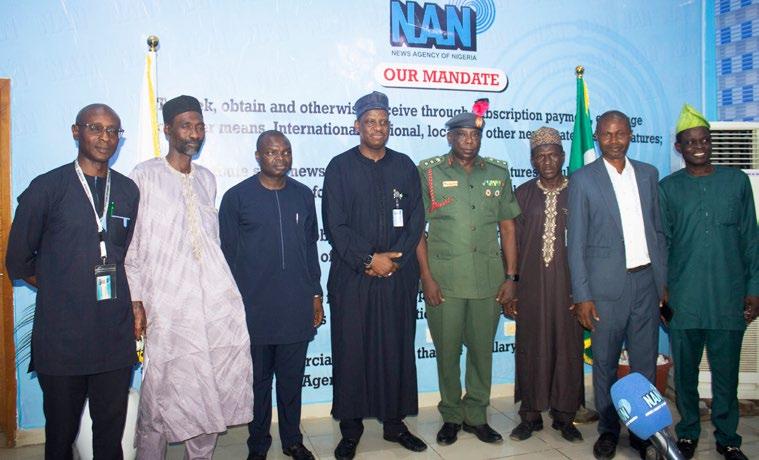
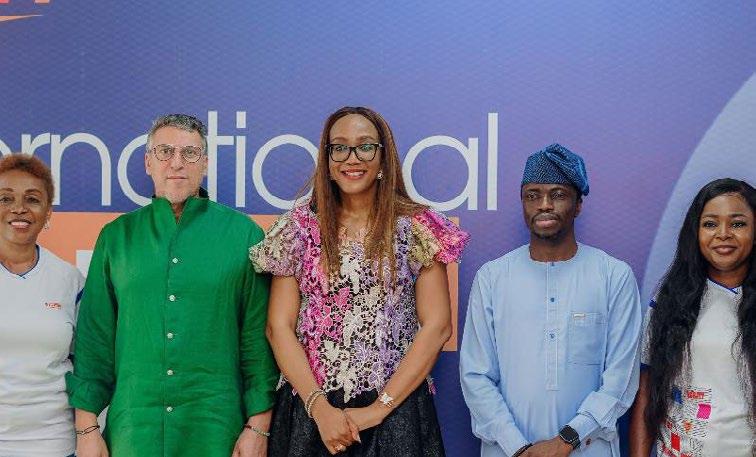







BY JUDE OBAFEMI
The Nigerian football community waited with great expectations for the announcement of the final 23-man Super Eagles squad for the vital 2026 World Cup qualifiers against Rwanda and Zimbabwe. On March 11, national team coach, Eric Chelle, revealed his selection, ending weeks of speculation following the release of a 39-man provisional list.
With Nigeria sitting fifth in Group C on just three points from four matches, the matches scheduled for March 21 in Kigali and March 25 in Uyo carry immense weight. Victory in both games remains essential to keep the country’s hopes of reaching the finals in the United States, Canada and Mexico alive.
Nigeria’s World Cup qualifying campaign stumbled early, with draws against Lesotho, Zimbabwe and South Africa, followed by a 2-1 loss to Benin Republic in June 2024. The Nigeria Football Federation turned to Eric Chelle in January 2025, appointing the Franco-Malian tactician who previously led Mali to the quarter-finals of the 2023 Africa Cup of Nations. His task involves reversing a winless streak in World Cup qualifiers stretching back to November 2021. The provisional squad of 39 players, released in early March, included a mix of established names and newcomers, sparking widespread discussion. There were questions about the return of 32-year-old Ahmed Musa, who has been
The final squad reflects a careful balance between experience and emerging talent

absent from the national team since a 2023 friendly and there were debates about the exclusion of players like Kelechi Iheanacho and Maduka Okoye.
Chelle trimmed this list to 23, revealing his priorities for the upcoming fixtures. The final squad reflects a careful balance between experience and emerging talent. Goalkeepers Stanley Nwabali, Amas Obasogie, and Kayode Bankole form the last line of defence, with Nwabali retaining his position despite personal challenges following the deaths of his parents. Bankole, a home-based player from Remo Stars in the Nigeria Professional Football League, earns his first call-up, signalling Chelle’s willingness to consider domestic talent. Defenders include William Troost-Ekong, Calvin Bassey and Igoh Ogbu, another debutant from Slavia Prague, alongside Ola Aina, Bright Osayi-Samuel, and Bruno Onyemaechi.
The midfield features Wilfred Ndidi, Alex Iwobi, Raphael Onyedika, Alhassan Yusuf, Joe Aribo, and Papa Daniel Mustapha, a third uncapped player from Plateau United. Up front, Victor Osimhen, Ademola Lookman, Victor Boniface, Samuel Chukwueze, Moses Simon, Nathan Tella, and Sadiq Umar provide attacking options.
Several tough decisions defined this list. Chelle opted to exclude Ahmed Musa, despite his inclusion in the provisional squad, ending the veteran’s hopes of adding to his 108 caps. Kelechi Iheanacho, a regular under previous coaches, also misses out, with his lack of game time at Sevilla likely a factor. Cyriel Dessers, scoring consistently for Rangers in Scotland, finds himself overlooked in favour of forwards like Tolu Arokodare, who earns a maiden call-up after impressing at Genk.
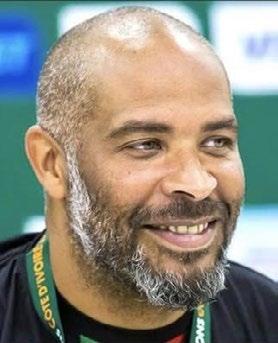
Defensively, the absence of Semi Ajayi due to a hamstring injury sustained at West Bromwich Albion opens the door for Ogbu, while Gabriel Osho, a regular at Auxerre, surprisingly fails to make the cut. Frank Onyeka’s exclusion from midfield raises eyebrows, given his energy at Brentford, though Chelle appears to prioritise creativity with Iwobi and Aribo. The inclusion of two Nigeria Professional Football League players, Bankole and Mustapha, marks a nod to local football, though it carries risks given their lack of international experience.

Tactically, Chelle’s selections suggest flexibility. During his tenure with Mali, he favoured a four-man defence, often deploying a 4-2-3-1 or 4-3-3 formation. With only three centre-backs named—Troost-Ekong, Bassey, and Ogbu—he may stick to this approach rather than the back three preferred by former coach Jose Peseiro. Nwabali seems certain to start in goal, supported by a back four likely featuring Aina and Onyemaechi at full-back, with Troost-Ekong and Bassey in the centre. Ndidi and Onyedika could anchor the midfield, allowing Iwobi to push forward and link with the attackers. Up top, Osimhen remains the focal point, his 22 goals in 28 games for Galatasaray this season underlining his importance. Lookman, fresh off a strong run at Atalanta, and Simon, with six goals and seven assists for Nantes, offer width and dynamism. Boniface, despite a dip in form at Bayer Leverkusen, provides a physical alternative, while Chukwueze and Tella add pace.
The match against Rwanda presents a stern test. The Amavubi lead Group C with seven points, having beaten Nigeria 2-1 in Uyo during Africa Cup of Nations qualifying in November 2024. Nigeria have never won in Kigali, drawing all three previous visits, including a 1-1 World Cup qualifier in 2005. Rwanda’s disciplined, counter-attacking style exposed the Super Eagles’ vulnerabilities last time, and Chelle must address this. A cautious approach, with Ndidi and Onyedika sitting deep to protect a thin defence, might suit the away fixture, relying on Osimhen and Lookman to exploit transitions. In contrast, the home game against Zimbabwe, who sit bottom with two points, offers a chance to dominate. Playing at the Godswill Akpabio International Stadium, where Nigeria thrashed Benin 3-0 in September 2024, Chelle could push for an aggressive start, using Simon and Chukwueze’s dribbling to stretch a weary defence after their travel from Kigali.
These selections carry significant implications for Nigeria’s World Cup hopes. Group C remains tight, with Rwanda, South Africa, and Benin Republic tied on seven points, Lesotho on five, and Nigeria on three. Only the group winner qualifies automatically, while the runner-up faces a play-off. Six points from these two matches would lift Nigeria to nine, potentially overtaking Lesotho and closing the gap to the leaders. Failure to win, however, could leave them too far adrift with just four games remaining. The Super Eagles’ pedigree—three Africa Cup of Nations titles and six World Cup appearances—demands success, and missing consecutive tournaments after 2022 would sting deeply. Chelle’s tenure begins under scrutiny; victories would build trust, while stumbles might fuel calls for change.
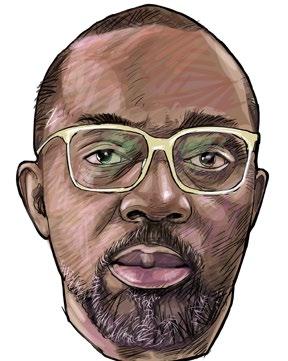

ogannah@thewillnews.com
Lagos has reached a new economic milestone, ranking as Africa’s second-largest city economy behind Cairo. The state government attributes this achievement to strategic economic policies, improved fiscal planning, and an expanding private sector. Recent reports indicate that Lagos now has a Gross Domestic Product of $259 billion based on the Purchasing Power Parity (PPP) evaluation model. The data, revealed in the Lagos Economic Development Update for 2025, highlights significant growth in various sectors of the economy. The first half of 2024 saw the economy expand to N27.38 trillion, a major increase from the N19.65 trillion recorded in 2023. Officials believe this progress reflects ongoing structural reforms and increasing investor confidence.
Purchasing Power Parity is an economic metric used to compare the value of goods and services across different countries by adjusting for differences in price levels. It provides a more accurate reflection of an economy’s true strength by considering what a unit of currency can buy locally rather than relying solely on nominal exchange rates. This method allows for a fair comparison of economies, as it accounts for cost-of-living differences that are not captured in traditional Gross Domestic Product calculations.
When a city or country is ranked using Purchasing Power Parity, it means its economic value is being measured in terms of real purchasing power rather than the fluctuating value of its currency in international markets. The use of this metric in Lagos’ latest economic ranking means that, despite fluctuations in the naira’s exchange rate, the city’s economic size and commercial activity remain strong enough to place it ahead of most African cities.
The government has projected further economic expansion, estimating that the state’s Gross Domestic Product will rise from N54.77 trillion in 2024 to N66.47 trillion in 2025. The expected growth rate ranges between 5.02 percent and 6.49 percent. The service sector remains the main driver of the economy, supported by agriculture and industrial production. Plans for fiscal stability rely on declining petrol prices and a more stable exchange rate. There are also projections that the state will generate N2.79 trillion in revenue for the 2025 fiscal year, which officials believe will strengthen government spending on infrastructure, technology, real estate, and manufacturing.
Governor Babajide Sanwo-Olu has described Lagos as a hub for trade, investment, and economic opportunities. He noted that the latest data proves the city’s growing influence in Africa. The report highlights the government’s commitment to fiscal responsibility and revenue generation. However, the state’s tax-to-Gross Domestic Product ratio remains low at 2.3 percent, which analysts say is insufficient to support long-term development. There is an ongoing push for better tax collection strategies to increase funding for major projects.
Despite the economic progress, there are areas where Lagos has not met expectations. The infrastructure deficit remains a major concern, with many roads in poor condition. While the state’s transportation system is considered one of the strongest in the country, it is still far from adequate. Traffic congestion remains severe, limiting movement across the city. Efforts to improve public transport include the expansion of the Bus Rapid Transit
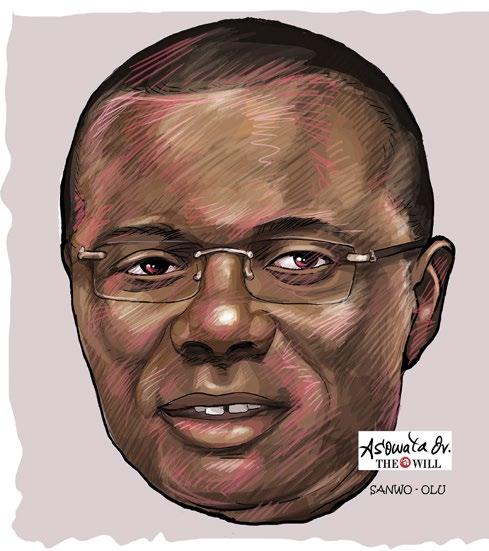
system and the introduction of the Lagos Blue Line rail project, but these initiatives have yet to resolve the larger problem of urban mobility.
Housing remains another significant challenge. Lagos has a high population density, and many residents struggle to find affordable accommodation. The housing sector is dominated by private developers, with little public intervention to regulate prices. Many areas lack basic facilities, forcing residents to rely on self-help solutions. There is no central water supply system, leaving much of the population dependent on boreholes, water tankers and unreliable sources. Electricity supply is also unstable, with frequent power cuts affecting businesses and daily life. The Lagos State Government has encouraged private investment in renewable energy solutions, but this has not yet delivered widespread improvements.
Security has seen improvements, but it is not yet at the level expected for a city with Lagos’ economic standing. Crime remains a challenge, particularly in certain areas where law enforcement presence is weak. The government has invested in surveillance technology and community policing initiatives, but these efforts have not completely addressed concerns about public safety. The high cost of living has also contributed to social pressures, with residents facing rising prices for essential goods and services. Inflation in Lagos is projected to be 34.2 percent in 2025, with food inflation expected to reach 34.9 percent.
The economic potential of the coastal areas has not been fully explored. Lagos has a natural advantage with its coastal location, but this has not translated into large-scale improvements in transportation and tourism. Water transport remains underdeveloped, despite efforts to encourage the use of ferries. Many coastal communities lack proper infrastructure
to support marine transport. Tourism has yet to reach its full potential, as many waterfront areas remain inaccessible or underutilised. Officials have discussed plans to develop these locations, but actual implementation has been slow.
Political uncertainty in the state has also raised concerns. The power struggle within the Lagos State House of Assembly over the speakership involving Mudashiru Obasa and Mojisola Meranda has created distractions from governance. Internal disputes within the ruling party have led to delays in legislative processes. These conflicts weaken decision-making and reduce the government’s ability to focus on long-term development goals. Stability in governance is essential for maintaining investor confidence and ensuring that economic policies are properly executed.
I want to state emphatically that while the economic milestone achieved by Lagos is significant, it does not automatically translate into better living conditions for residents. Many of the challenges facing the city require immediate attention. Infrastructure investment must be matched with stronger regulation and enforcement to ensure that roads, housing, and essential services meet global standards.
Tax reforms are necessary to increase government revenue, but they must be balanced with policies that do not overburden businesses and residents. Lagos has the potential to improve revenue collection without resorting to excessive taxation. The government can explore methods such as property taxation, broadening the personal income tax base, and improving tax compliance among high-income earners. These strategies could significantly increase the state’s internally generated revenue without discouraging investment.
The informal sector, which includes digital entrepreneurs, content creators, and small businesses, remains largely untaxed. Formalising these sectors could provide a new source of revenue for the government. However, this must be done in a way that does not stifle small businesses, as they play a critical role in the state’s economy.
Investment in coastal development could transform transportation and tourism in Lagos. Water transport should be prioritised as an alternative to road travel. This would reduce congestion and create new economic opportunities. Properly planned waterfront projects could also attract investors to the tourism sector.
Long-term economic growth will depend on how well the government addresses these challenges. Lagos has positioned itself as a major economic hub, but the benefits must be reflected in the daily experiences of its residents. Economic expansion should lead to better roads, reliable public services and a higher standard of living.
The state’s administration must focus on strengthening governance, improving infrastructure, and implementing policies that encourage sustainable development. While there is cause for optimism, there is also a need for serious reflection on the areas where Lagos has fallen short. The economic statistics may indicate progress, but real success will only be achieved when Lagosians experience tangible improvements in the quality of life.
Lagos has positioned itself as a major economic hub, but the benefits must be reflected in the daily experiences of its residents. Economic expansion should lead to better roads, reliable public services and a higher standard of living